
34 minute read
The Block Museum of Art - Fall 2019
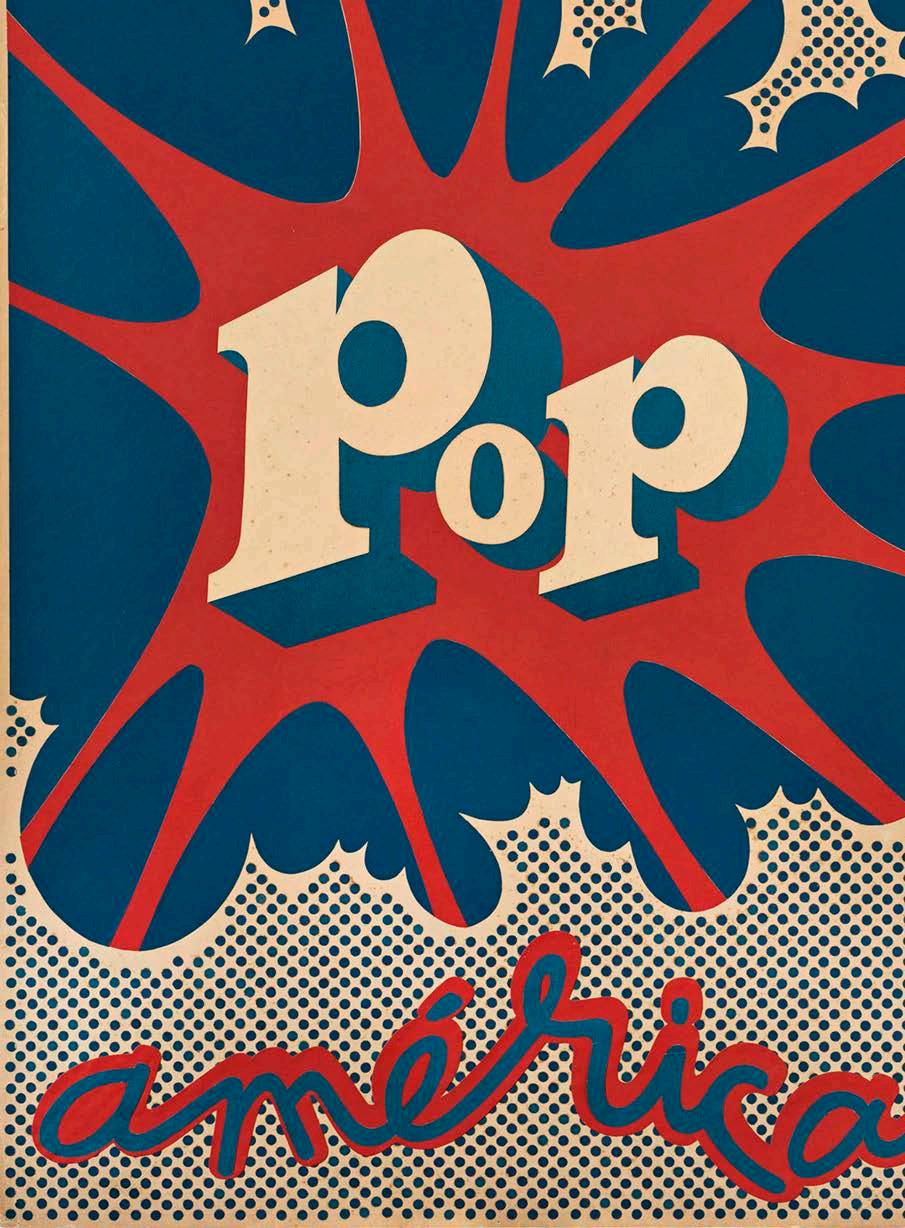

What’s inside The Block? It depends on how you look.
HOURS Mon. Tues./Sat./ Sun. Wed./ Thurs./ Fri.
CLOSED 10 AM – 5 PM 10 AM – 8 PM
FREE ADMISSION Admission to exhibitions, screenings, and programming is always free and open to all.
RSVP Let us know you are coming! The Block Museum maintains a suggested RSVP list for public program offerings: bit.ly/BlockRSVP
Event entry is first-come, first-served, and RSVP does not guarantee entry if capacity is reached.
CONTACT US Phone 847. 491. 4000 Email block-museum@northwestern.edu Web blockmuseum.northwestern.edu
GETTING HERE Location The Block Museum of Art is located at 40 Arts Circle Drive, on the southeastern portion of Northwestern’s Evanston campus, near the lake and Sheridan Road.
Parking Guest parking is available at the Segal Visitors Center Garage (1847 Campus Drive, Evanston). Parking is FREE after 4 PM on weekdays and all day on weekends. All other times parking is $8. The Arts Circle Drive is open to vehicles, and patrons with disabilities will find an accessible location for pick-up and drop-off directly in front of the museum.
Public Transportation The Block Museum is a 15–20 minute walk from the Davis and Foster stations on the CTA’s Purple Line. The Davis station has an elevator. On the Metra, the museum is a 15–20 minute walk from the Union-Pacific North Davis station.
Follow us! @nublockmuseum or https://nublockmuseum.blog
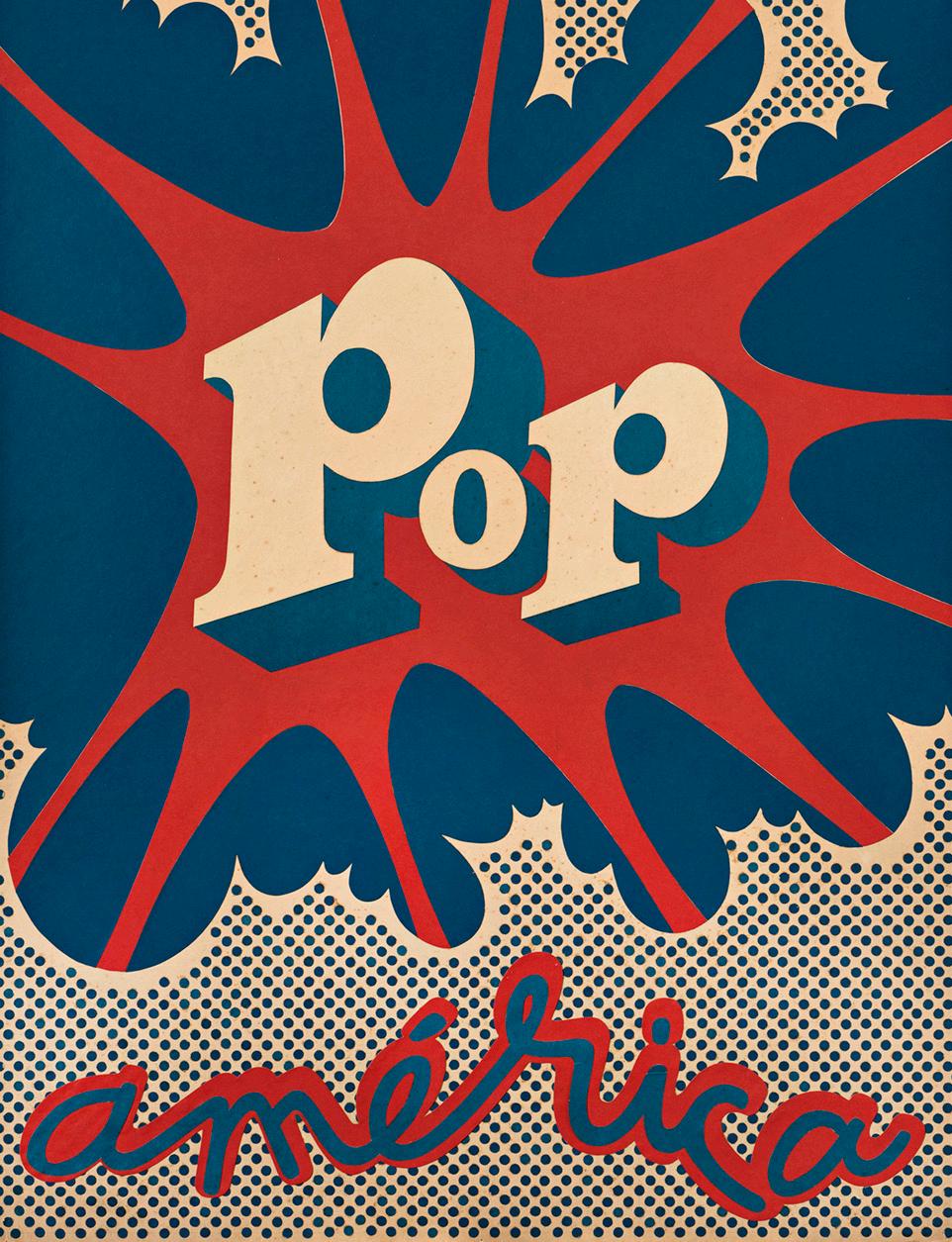
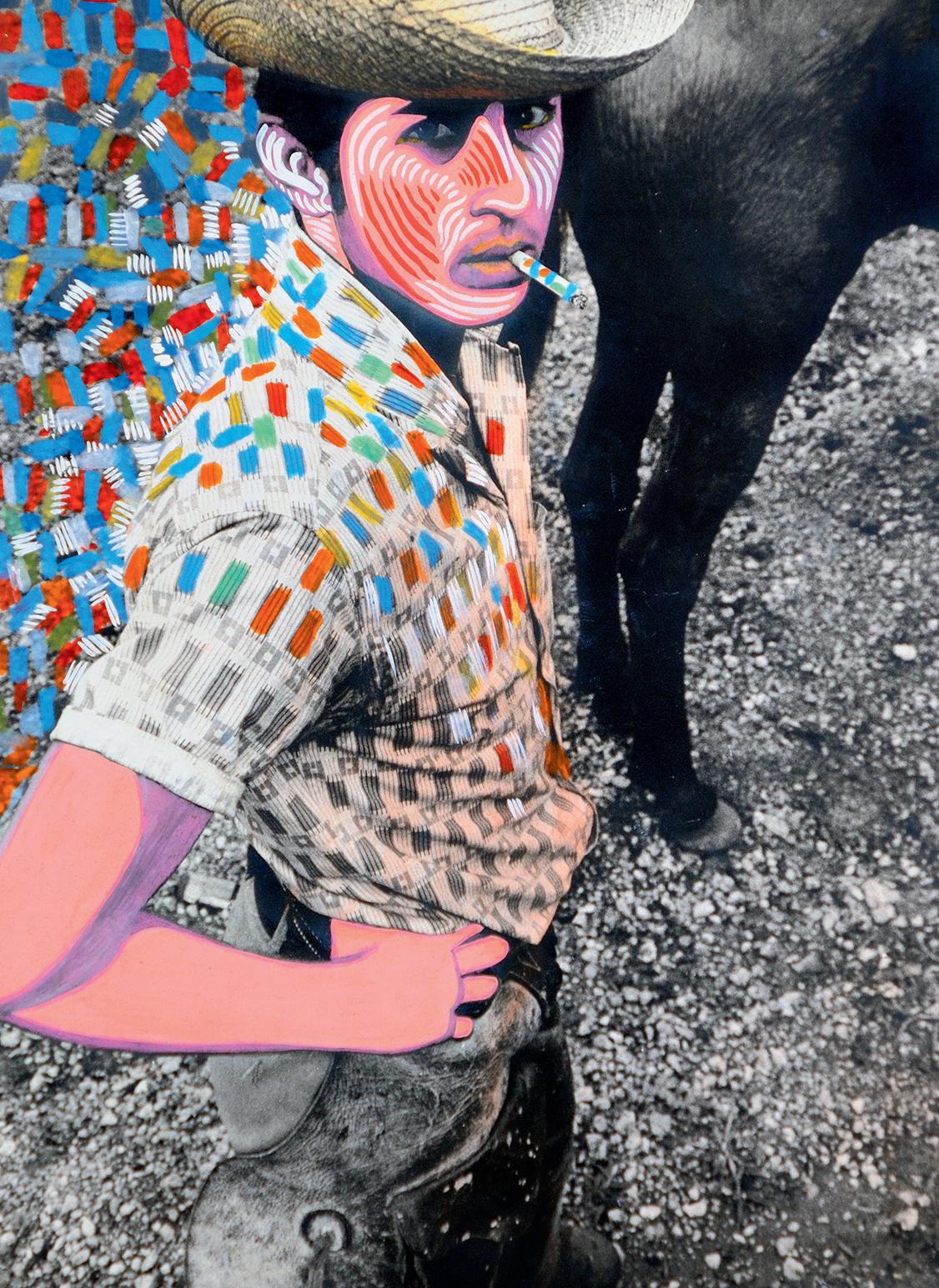
Pop América, 1965–1975 September 21–December 8, 2019 Main Gallery & Alsdorf Gallery
Pop América, 1965–1975 challenges and reframes familiar notions of Pop Art by bringing together artists from North and South America, as well as from the United States and the Caribbean. Pop América is the first exhibition to unify Latin American and Latinx expressions of Pop and explore how arists working across the hemisphere embraced its bold and colorful imagery, references to mass culture, and representations of everyday objects, signs, and symbols. The exhibition makes a timely and critical contribution to a deeper understanding of this period and the impulses behind Pop Art from the mid-1960s through the mid-1970s.
Pop América features nearly 100 artworks by artists working in Argentina, Brazil, Chile, Colombia, Cuba, Mexico, Peru, Puerto Rico, Venezuela, and the United States, sparking an expansion and reconsideration of Pop as a US and British phenomenon. The exhibition reshapes debates over Pop’s perceived political neutrality and aesthetic innovations. The artists in the exhibition create vital dialogues that cross national borders and include Antonio Dias, Rubens Gerchman, Roy Lichtenstein, Marisol, Cildo Meireles, Marta Minujín, Hugo Rivera-Scott, and Andy Warhol, among others. United by their use of Pop’s visual strategies, these artists have made bold contributions to conceptualism, performance, and new media art, as well as social protest, justice movements, and debates about freedom.
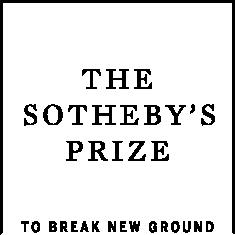
Pop América opened in fall 2018 at the McNay Art Museum in San Antonio, Texas, and was on view winter and spring 2019 at the Nasher Museum of Art at Duke University before traveling to the Block Museum at Northwestern University. The exhibition is a recipient of the inaugural Sotheby’s Prize.
Pop América, 1965–1975 is co-organized by the Nasher Museum of Art at Duke University, Durham, North Carolina, and the McNay Art Museum, San Antonio, Texas. The exhibition is a recipient of the Sotheby’s Prize and is supported by The Andy Warhol Foundation for the Visual Arts and the Institute for Studies on Latin American Art (ISLAA). This project is supported in part by the National Endowment for the Arts and The Alumnae of Northwestern University.
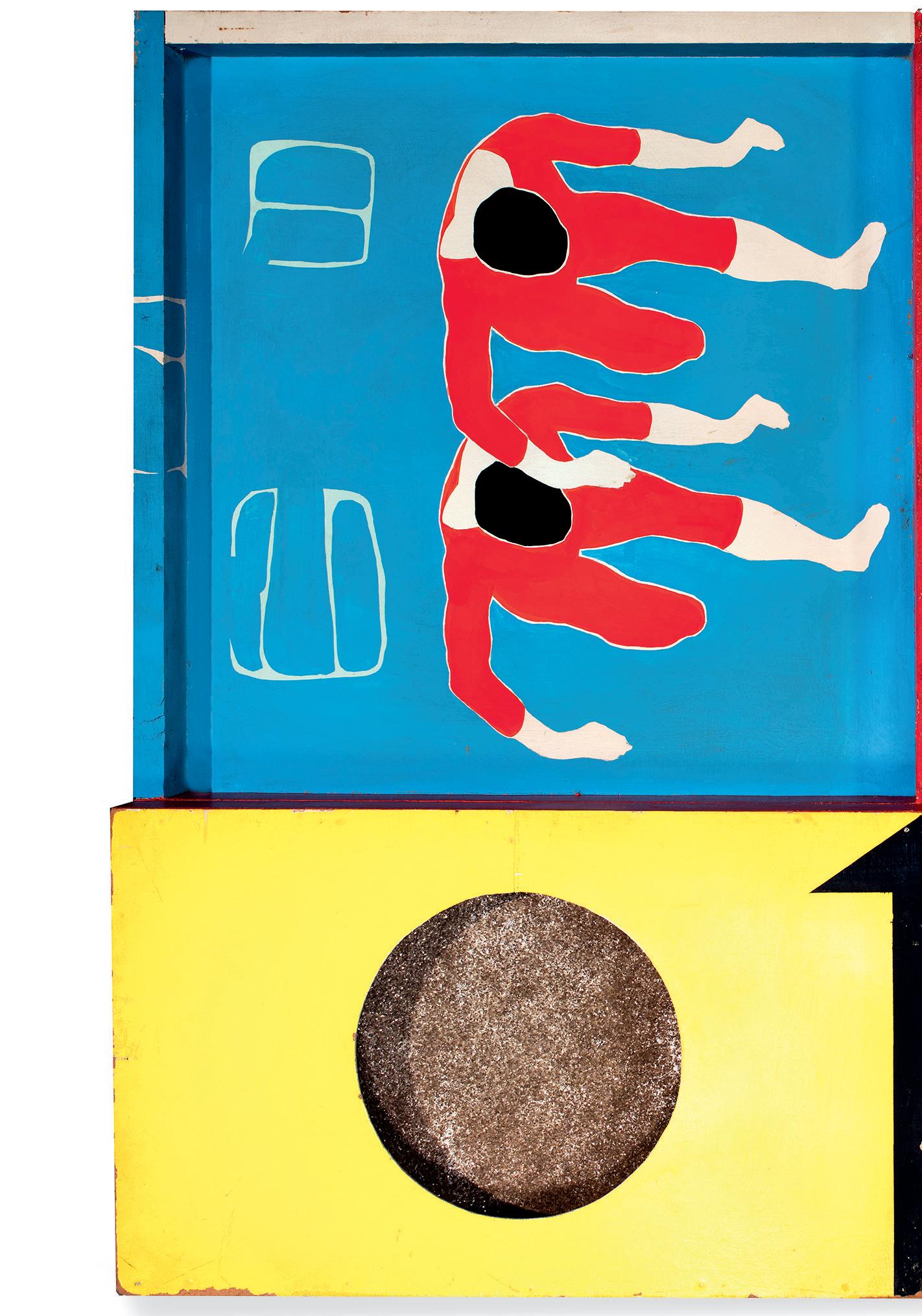
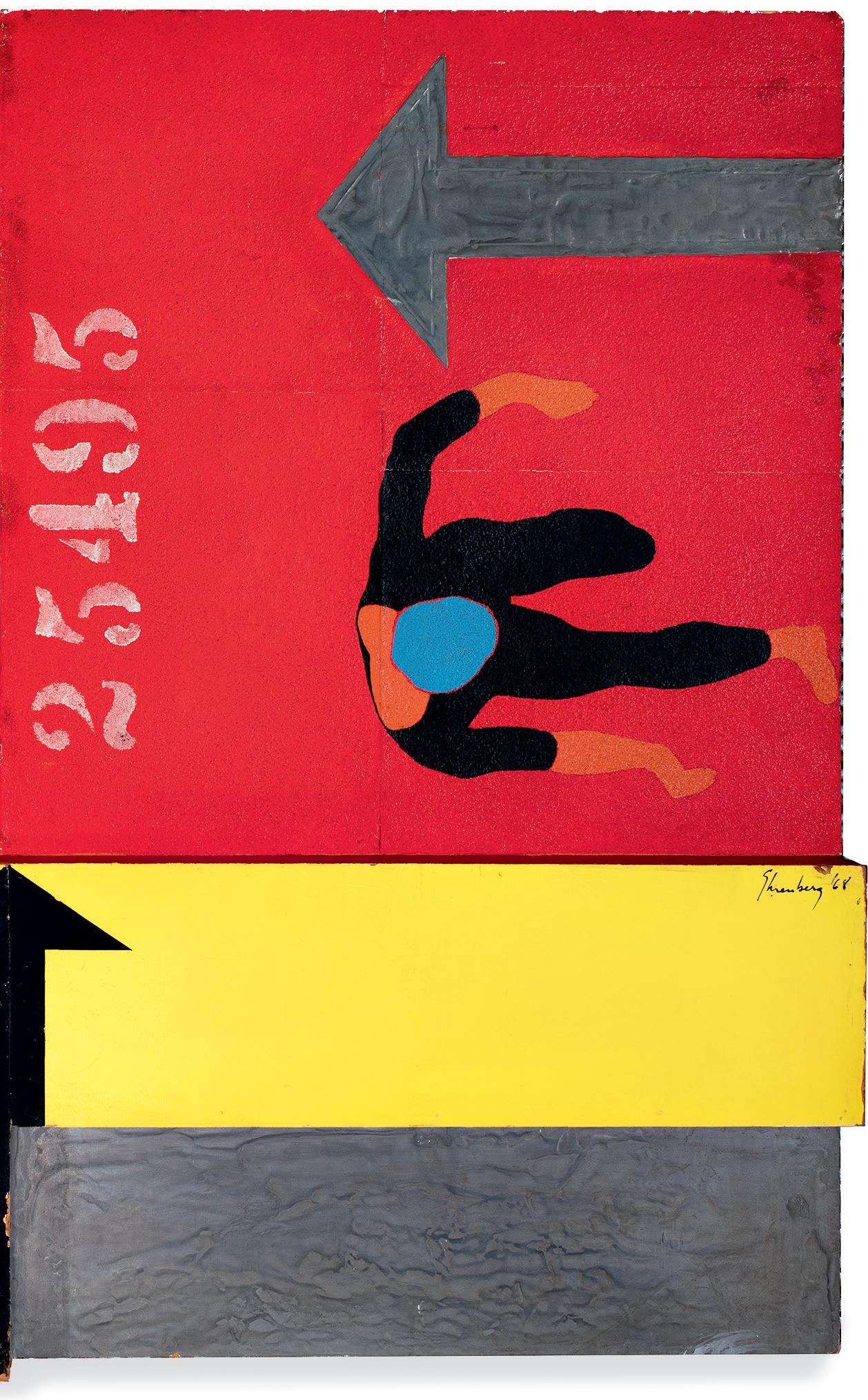
OPENING CELEBRATION Pop América Pop In Saturday, September 28 Open house 12 PM – 4 PM
Join us for an all-ages open house to celebrate the opening of Pop América, 1965–1975, an exhibition that brings together artists from North and South America, as well as the Caribbean, to reframe our understanding of Pop Art. Pop América is the first exhibition to unify Latin American and Latinx expressions of Pop and explore how its bold, colorful imagery and political potential were embraced by artists working across the hemisphere.
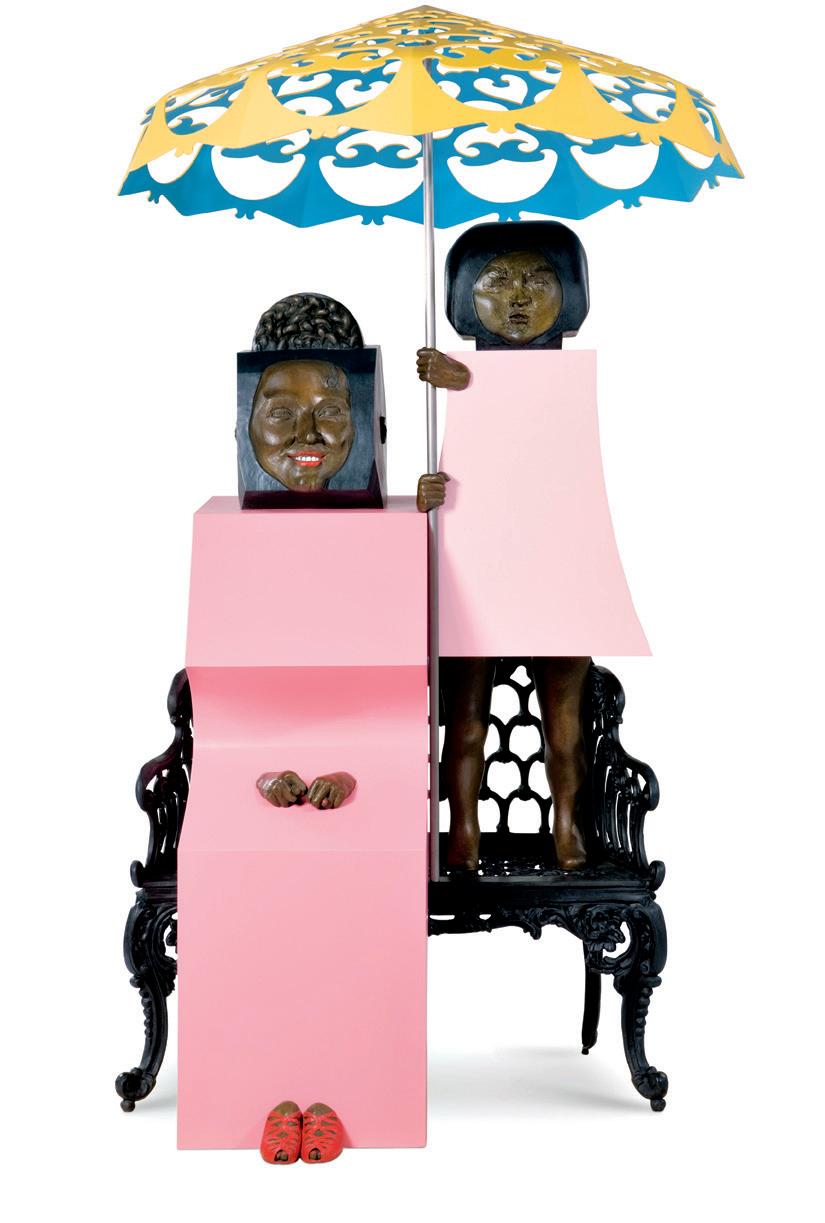
Pop by for activities happening throughout the afternoon:
12 PM - 4 PM • Ink Up Roll up your sleeves with Instituto Gráfico de Chicago (IGC) and participate in printmaking activities for all ages. Run a print through IGC’s printing press or create your own original artwork using designs inspired by Pop América.
12 PM - 2 PM • Tune In Watch and tune in to a radio broadcast recorded on-site at the museum by members of Pop Up Youth Radio (PUYR), a project of Yollocalli Arts Reach, the youth initiative of the National Museum of Mexican Art.
1 PM & 3 PM • Get Down Hear live music sets by Chicago-based ensemble Trío Calavera, playing son jarocho—Mexican folk music that fuses African, Spanish-Arabic, and Indigenous music and poetry.
2 PM • Pop Around Take a tour of exhibition highlights with Block Museum curator Corinne Granof.
The Block Museum of Art is proud to partner with Chicago’s National Museum of Mexican Art (NMMA) on the opening celebration and a number of events this season. NMMA stands as one of the most prominent first-voice institutions for Mexican art and culture in the United States. This fall, NMMA presents an interpretive lens on the politics and aesthetics of Pop América, taking the exhibition as a starting point for considering contemporary issues and ideas about Mexican culture. considering contemporary issues and
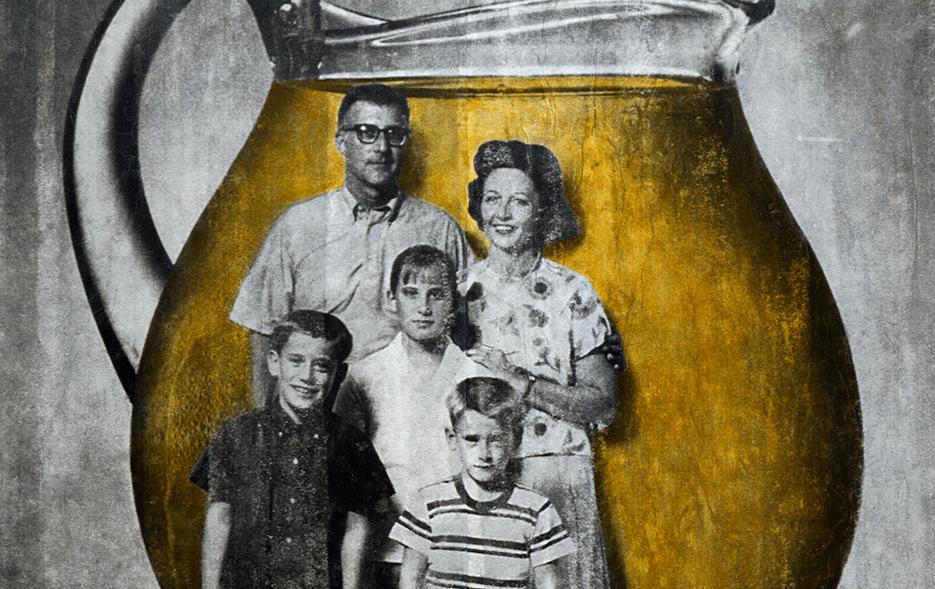
EXHIBITION KEYNOTE Contesting Freedom: Pop América, 1965–1975 Curator Conversation with Esther Gabara Wednesday, October 2, 6 PM
The groundbreaking exhibition Pop América draws attention to Latin American and US Latino/a artists who turned the “Pop” of Pop Art into a verb by using familiar images of modern life— including mass media, fashion, food, and advertising—to make forceful interventions into art and society. Audience members will have a chance to hear directly from Esther Gabara, curator of Pop América, about the politics of Pop as well as the artists from across the hemisphere who shared dreams and struggles over the idea of a singular América.
Gabara is E. Blake Byrne Associate Professor of Romance Studies and Art, Art History & Visual Studies at Duke University. She will be joined in conversation by Alejandra Uslenghi, Northwestern Associate Professor of Spanish & Portuguese and Comparative Literary Studies, and Daniel Quiles, Assistant Professor of Art History, Theory, and Criticism at the School of the Art Institute of Chicago.
Presented by The Block Museum in partnership with the Northwestern University Department of Spanish and Portuguese.
9 THE BLOCK MUSEUM OF ART Left: Marisol Escobar (known as Marisol), Mi mamá y yo (My Mother and I), 1968. Steel and aluminum. Collection of Albright-Knox Art Gallery, Buffalo, New York. Bequest of Marisol, 2016. © 2018 Estate of Marisol. Licensed by Artists Rights Society (ARS), New York, New York. Right: Juan José Gurrola, Familia Kool Aid (Kool Aid Family) from the series Dom-Art, c. 1966–1967. Photographic slide. Courtesy of the Fundación Gurrola A.C. and House of Gaga, Mexico City, Mexico, and Los Angeles, California. Photo by Nattan Guzmán.
Mi casa es su casa. The popular Spanish saying regarding Mexican hospitality is as familiar to US tourists as it is in towns across Mexico. The saying implies the ideas of extended families and of home. Join Cesáreo Moreno, Visual Arts Director and Curator for the National Museum of Mexican Art, to examine select works in Pop América created by Mexicans on both sides of the border and uncover similarities among them. Like primos hermanos (first cousins), many of the works of art, and the artists who created them, share a creative lineage, a culture without borders.
Presented by The Block Museum in partnership with the National Museum of Mexican Art.
Antonio Caro, Colombia Coca-Cola, 1976. Enamel on sheet metal, edition 11/ 25, 19.5 x 27.5 inches. Collection of the MIT List Visual Arts Center, Cambridge, Massachusetts. Purchased with funds from the Alan May Endowment. Image courtesy of the artist and Casas Riegner, Bogotá, Colombia. © Antonio Caro.
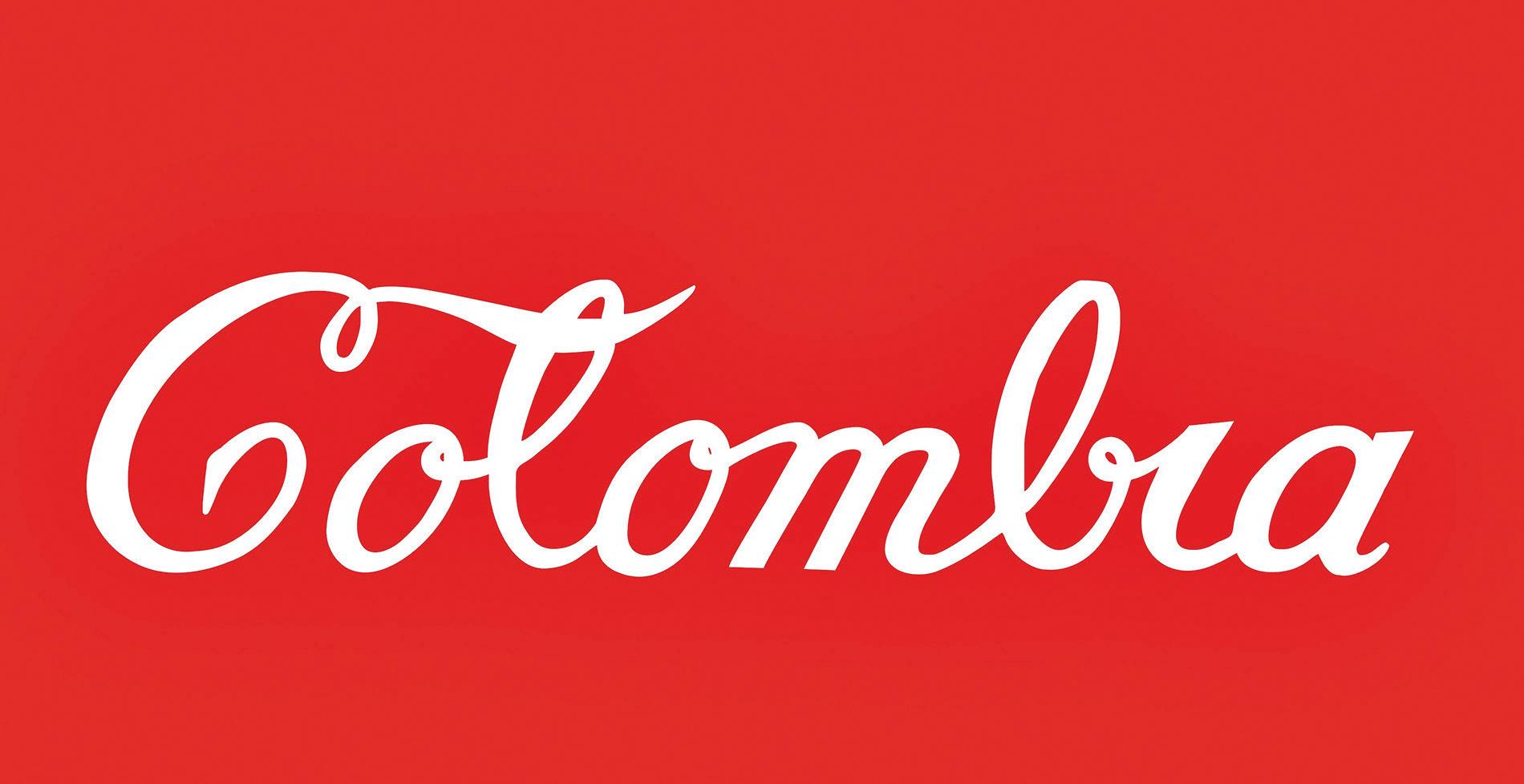
GALLERY TALK Jerónimo Duarte-Riascos and Alejandra Uslenghi: The Politics of Soups and Sodas Wednesday, October 23, 6 PM
Jerónimo Duarte-Riascos and Alejandra Uslenghi, Northwestern Professors in the Department of Spanish and Portuguese, will lead a gallery tour highlighting female artists’ involvement in the Pop movement, engaging artworks that bring the language of new media and conceptualism in dialogue with emancipatory movements. The talk will then consider the politics of “soups and sodas” and the ways in which artists used everyday consumer objects to present and embody critiques of the status quo in Latin America and the US.
Antonio Berni, Mediodía (Noontime), 1976. Acrylic and collage on canvas, 78.22 x 78.34 inches (198.7 cm x 199 cm). Collection of the Blanton Museum of Art, the University of Texas at Austin. Barbara Duncan Fund, 1977.97. © José Antonio Berni.
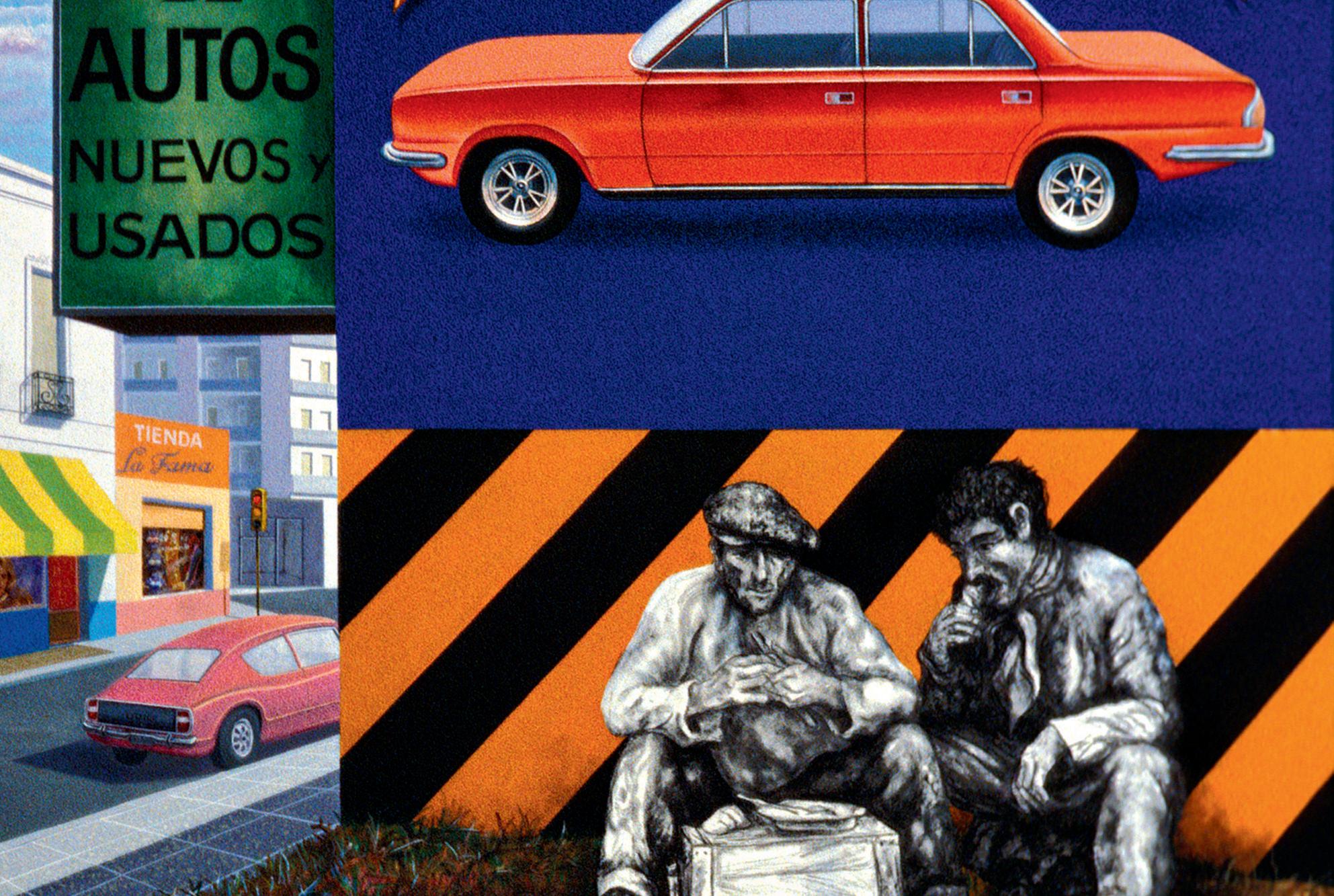
CONVERSATION América Now: Chicago Artists in Dialogue Wednesday, October 30, 6 PM, with reception at 5:30 PM
Join us for an in-depth conversation with three Chicago artists facilitated by Sarita Hernández of the National Museum of Mexican Art. The panel will discuss how their practices are rooted in issues of identity and community, and how ideas and approaches from Pop América remain relevant in our contemporary moment. • Vicko Alvarez Vega is a comic artist, organizer, and educator whose work involves themes of growing up Latinx, queerness, and processing the fear of deportation. • Nicole Marroquin is a teacher, educator, and artist whose work explores belonging and spatial justice. She has been researching student uprisings in Chicago Public Schools that occurred from 1967 to 1974. • Diana Solís is a visual artist and art educator who has taught for over 30 years at organizations that include Urban Gateways, Jane Addams Hull-House Museum, Gallery 37, and ElevArte Community Studio.
Presented by The Block Museum in partnership with the National Museum of Mexican Art. Reception and marketing support courtesy of The Alumnae of Northwestern University. Presented in conjunction with One Book One Northwestern and Northwestern: 150 Years of Women.
DEPARTMENT OF ART HISTORY WARNOCK LECTURE SERIES Dell Upton: Putting Monuments in their Places Wednesday, November 6, 5 PM
Dell Upton, Distinguished Professor of Architectural History in the Department of Art History, University of California, Los Angeles, will deliver a talk on recent struggles around Confederate monuments within American civic space. The author of What Can and Can’t Be Said: Race, Uplift, and Monument Building in the Contemporary South (2015), Upton will consider Confederate statues in relation to European monuments to develop insights into the distinctive situation of the American South.
Presented by the Department of Art History at Northwestern University.
LECTURE The Politics of Taste: Ana María Reyes on Beatriz González Wednesday, November 20, 6 PM
In the ’60s and ’70s many Latin American artists seized opportunities to reinvigorate the arts through the aesthetics of urban popular culture, impoverished materials, recycling strategies, ephemeral interventions, movable graffiti, and practices of dematerialization. Colombian artist Beatriz González is one such artist who forged radical new aesthetics that call attention to urban consumerism as well as appropriation, recycling, and reproduction. Ana María Reyes, Assistant Professor in Latin American Art History, Boston University will discuss her forthcoming book, The Politics of Taste: Beatriz González and Cold War Aesthetics (2019) which examines González’s essential legacy in Latin American art history.
Presented by The Block Museum in partnership with the Northwestern University Department of Spanish and Portuguese.
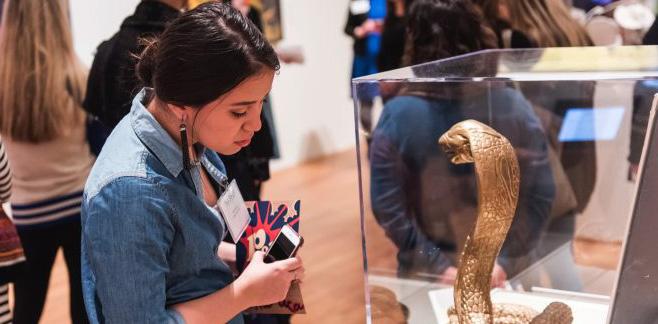
Young Visitors to Tales of Art at The Block. Photo by Sean Su.
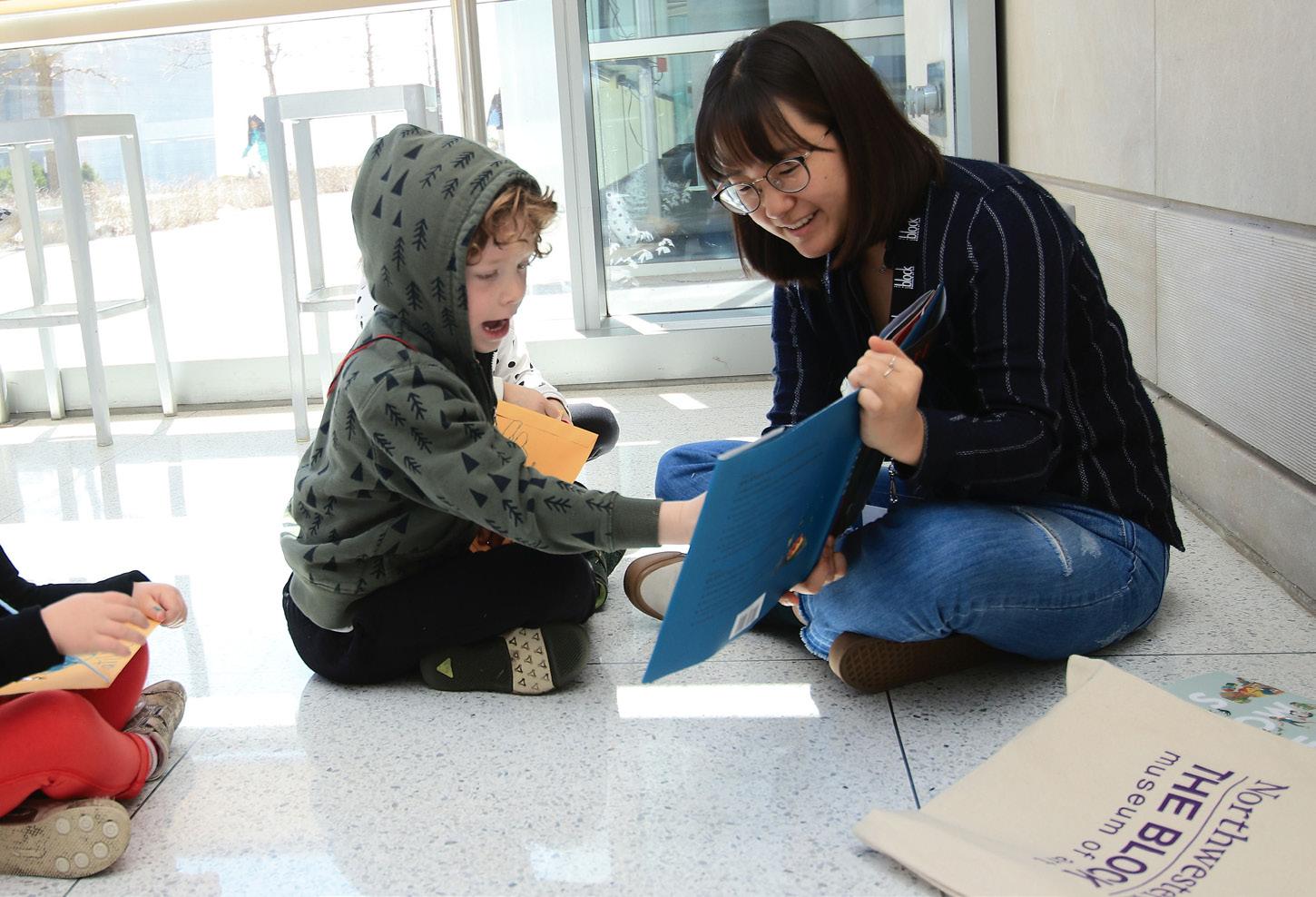
FAMILY PROGRAM Tales of Art at The Block Saturday, October 19, 1:30 PM – 3:30 PM Saturday, November 9, 10:30 AM – 12:30 PM
Museums are full of stories. Join us for read-aloud stories and interactive activities designed to help you look closer and think deeper about the art on view at the museum. Come discover the stories hidden beneath the surface of the art at The Block and invent your own. Geared for children ages 3-8 but all are welcome. Space is limited and registration is required.
WORKSHOP The Poetry of Pop América Wednesday, December 4, 5:30 PM
All are welcome to a poetry discussion and creative writing workshop in conversation with Pop América, 1965–1975. Together, we will read and discuss Pop poems from a wide range of North, Central, and South American poets. After engaging with the exhibition, we will compose original poems in dialogue with the works on view, including themes related to the concept of “America,” nationality, borders, and migration. Maggie Queeney of The Poetry Foundation will lead the session. Space is limited and registration is required.
Students tour Pop América exhibition at the Nasher Museum of Art.
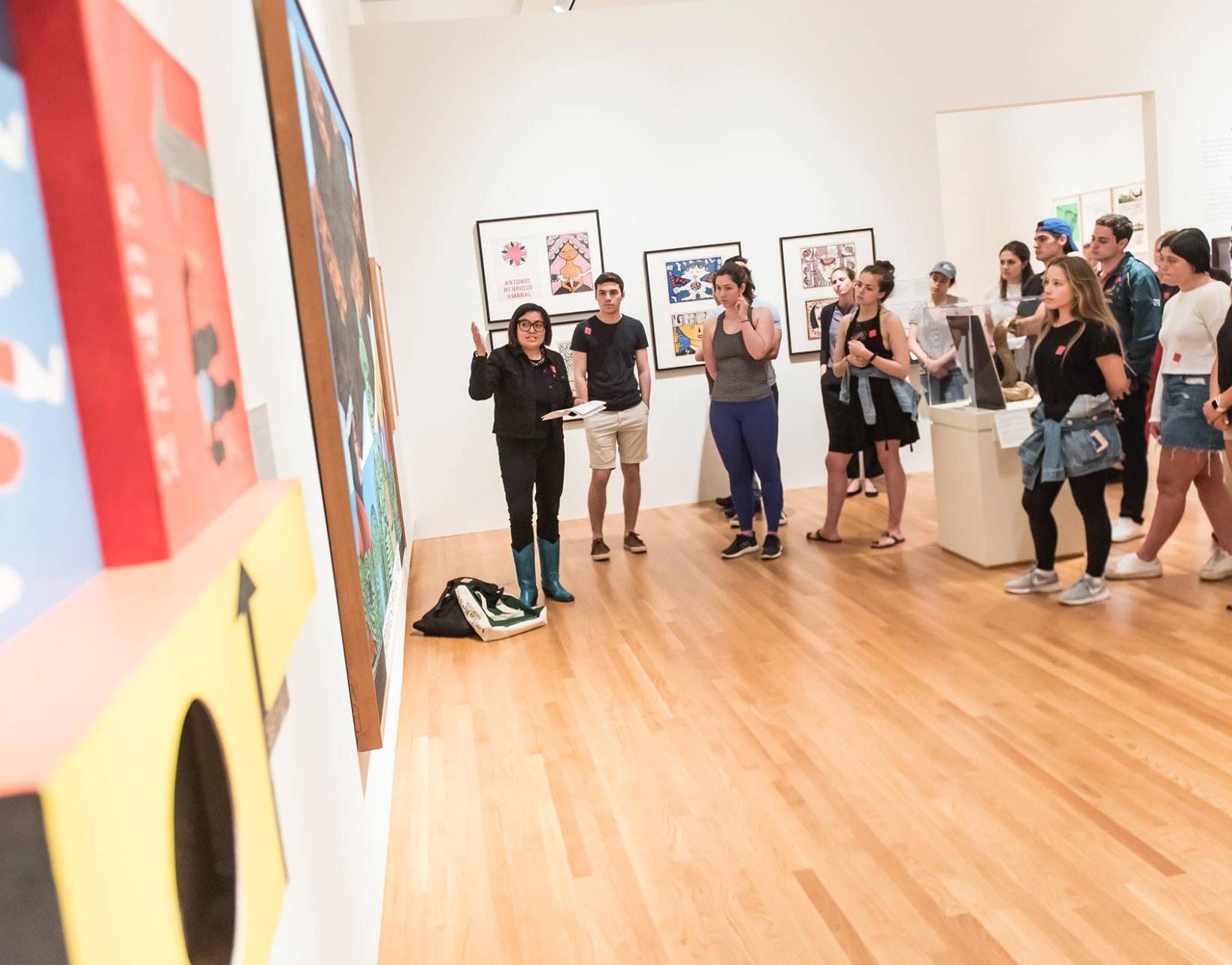
Schedule a Group Visit to Pop América
Bring your group to The Block Museum for a free gallery tour of our current exhibitions. We are happy to work with you to plan a visit that meets your group’s needs and interests. All guided tours are led by Northwestern student docents, who come from a wide range of academic backgrounds, including art history, psychology, journalism, science, and engineering. On guided tours, our docents provide information about the works on view and also facilitate open discussion. If you would like to request a tour for your organization, please visit our website to complete a request form.
Visit our Eloise W. Martin Study Center
We welcome scholars, classes, and researchers to our Eloise W. Martin Study Center to further explore The Block Museum’s permanent collection. To select works for your visit, you may search the online database or contact one of the curators. Appointments can be scheduled for Monday through Friday between the hours of 10 AM and 4 PM. To schedule your appointment, contact Collections Coordinator Joseph Scott at 847.467.0734 or printroom@northwestern.edu.
Pop América Sunday Afternoon Tours Select Sundays, 3 PM
Explore Pop América with The Block Museum’s student docents. These free, informal tours kick off in the museum lobby at 3 PM and can be tailored to the questions and interests of those attending. Tours typically last 45–60 minutes.
October 6 October 13 October 20 October 27
Pop América Tuesday Lunchtime Tours Tuesday, October 1, 12 PM Tuesday November 5, 12 PM Tuesday, December 3, 12 PM
Take part in a lunch-time walk-through of Pop América led by a member of the curatorial team. These free tours kick off in the museum lobby.
Pop América Spanish Language Tours
Pop América Chicago Humanities Festival Tours Sunday, October 27, 12:30 PM and 3 PM
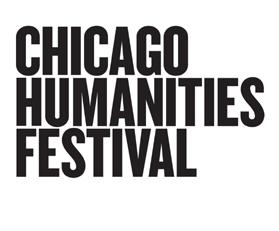
The Block welcomes the Chicago Humanities Festival for its annual Evanston Day on Sunday, October 27. Join us for two free tours in conjunction with the day’s rich programming.
26 Thursday
7 PM
CINEMA Chicagoland Shorts Vol. 5
27 Friday
6:30 PM
CINEMA Félicité (2017)
p. 18
p. 28
28 Saturday
12 PM - 4 PM
OPENING DAY Pop América Pop In
2 Wednesday October
6 PM
EXHIBITION KEYNOTE Contesting Freedom: Esther Gabara
3 Thursday
7 PM CINEMA Ism, Ism, Ism: Dialogues with Che 4 Friday
7 PM
CINEMA My First Film
10 Thursday
7 PM
CINEMA The Elephant Man (1980)
11 Friday
7 PM
CINEMA Ism, Ism, Ism: Dreams of Suitcases and a Blue Lobster
16 Wednesday
6 PM
GALLERY TALK Cesáreo Moreno: Mi Casa es Su Casa
7 PM
CINEMA Sisters in Cinema: An Evening with Yvonne Welbon
17 Thursday
7 PM
CINEMA Nostalgia for the Light (2010)
p. 8
p. 9
p. 23
p. 29
p. 20
p. 23
p. 10
p. 26
p. 29
CINEMA Ism, Ism, Ism: Countercultures and Undergrounds
19 Saturday
1:30 PM– 3:30 PM
FAMILY PROGRAM Tales of Art at The Block
23 Wednesday
6 PM
GALLERY TALK The Politics of Soups and Sodas
7:30 PM
CINEMA One Way or Another (1974/77)
24 Thursday
7 PM
CINEMA The Red Light Bandit (1968)
p. 13
p. 26
25 Friday
7 PM
CINEMA Horror Noire: A History of Black Horror (2019)
30 Wednesday
6 PM
CONVERSATION América Now: Chicago Artists in Dialogue
31 Thursday
7 PM
CINEMA I Walked with a Zombie (1943)
November
1 Friday
7 PM & 8:30 PM
CINEMA Ism, Ism, Ism: Recycled Cinema & Estrellas de Ayer: Latin Camp
2 Saturday
12:30 PM & 3 PM
CINEMA Eyeworks Festival of Experimental Animation
6 Wednesday
5 PM
WARNOCK LECTURE Dell Upton
CINEMA The Prison in Twelve Landscapes (2016)
8 Friday
7 PM
CINEMA The Hottest August (2019)
9 Saturday
10:30 AM– 12:30 PM
FAMILY PROGRAM Tales of Art at The Block
14 Thursday
7 PM
CINEMA Spotlight on Undergraduate Filmmaking
15 Friday
7 PM
CINEMA Whose Streets? (2017)
p. 27
p. 13
p. 18
p. 30
20 Wednesday
6 PM
LECTURE Ana María Reyes on Beatriz González
21 Thursday
7 PM
CINEMA Amazements: Emily Vey Duke and Cooper Battersby
22 Friday
7 PM
CINEMA The Life of Juanita Castro (1965)
December
4 Wednesday
5:30 PM
WORKSHOP Poetry of Pop América
6 Friday
7 PM
CINEMA When the Earth Trembled, or The Strength of Love (1913)
p. 12
p. 30
p. 19
p. 13
p. 30
TOURS OF POP AMÉRICA
Tuesday Curatorial Tours 12 PM October 1, November 5 and December 3
Sunday Docent Tours 3 PM October 6, 13, 20, 27 November 3, 10, 17, 24 December 8
Spanish Language Tours 3:30 PM Saturday, October 19 Saturday, November 9
UPCOMING EXHIBITIONS
January 21–April 5, 2020 Modernisms: Iranian, Turkish, and Indian Highlights from NYU’s Abby Grey Collection
January 21–April 5, 2020 Terence Gower: Ciudad Moderna
April 28– July 26, 2020 Taking Shape: Abstraction from the Arab World, 1950s–1980s
Block Cinema continues its ongoing series of screenings spotlighting the work of filmmakers from Northwestern and the larger Chicago community with two screenings that focus on local organizations that support diversity in media making, on campus and off.
Northwestern’s Studio 22 Productions
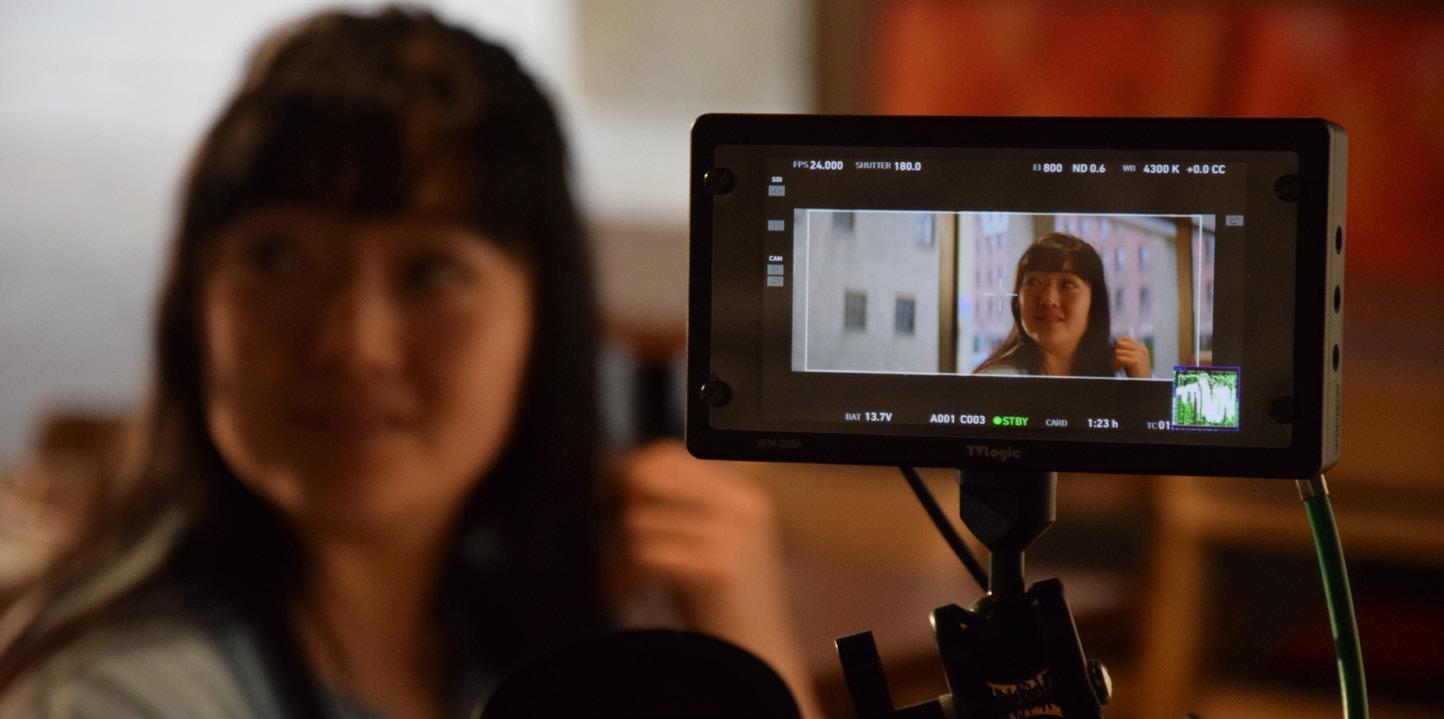
Chicagoland Shorts Vol. 5 78 min Thursday, September 26, 7 PM Various Artists, 2017–2019, USA, digital and 35mm Organized by Full Spectrum Features, a nonprofit committed to producing, exhibiting, and supporting the work of women, LGBTQ, and minority filmmakers, this annual showcase of local work includes a dynamic selection of recent experimental, narrative, documentary, and performance-based short films. These selections creatively engage with the home-movie format, archival material, family dynamics, the Internet, climate and landscape, the Great Migration, and the history of a town in Colombia. Curated by Raul Benitez (Full Spectrum Features/Comfort Film), Melika Bass (independent filmmaker/SAIC professor), and Emily Eddy (Nightingale Cinema/Video Data Bank), the program includes work by graduates of NU’s MFA in Documentary Media program. In person: selected curators and filmmakers
Spotlight on Undergraduate Filmmaking Thursday, November 14, 7 PM
This screening celebrates Northwestern student filmmakers with a showcase of recent work produced under the auspices of three campus associations: the Multicultural Filmmakers Collective, the Northwestern University Women Filmmakers Alliance, and the student-run production company Studio 22. Presenting a mix of dramatic and comedic shorts, this program demonstrates the collective vitality and diversity of undergraduate filmmaking at Northwestern. After the screening, filmmakers and representatives from each organization will discuss the opportunities for creative support and collaboration on campus.
Pop América, 1965–1975 presents Pop Art as a cultural dialogue transgressing the borders of nations, the boundaries of media, and the limits of “good taste.” The same can be said of these two films, made in Brazil and the United States, that speak to each other in languages borrowed equally from advertisements, news reports, soap operas, and the avant-garde.
The Red Light Bandit 92 min Thursday, October 24, 7 PM Rogério Sganzerla, 1968, Brazil, DCP
This delirious “Third World western” offers a subversive, New Wave–inspired spin through the trash heap of Brazilian pop culture. With The Red Light Bandit, a farcical account of a real-life serial criminal made larger-than-life by the news media, 21-year-old director Rogério Sganzerla delivered the signature work of Brazil’s Cinema Marginal, a radical film movement dedicated to the rejection of good taste. “I will never deliver clear ideas, eloquent speeches, or classically beautiful images when confronted with garbage,” Sganzerla declared: “I will only reveal, through free sound and funereal rhythm, our own condition as ill-behaved, colonized people. Within the garbage can, one must be radical.”
The Life of Juanita Castro 66 min Friday, November 22, 7 PM Andy Warhol, 1965, USA, 16mm
Camp, historical topicality, New York’s underground theater scene, and Warhol’s disarming and energizing anti-cinema approach to filmmaking all combine in this loosely scripted, irreverent portrait of Fidel Castro and his family (some members of which are played by experimental filmmaker Marie Menken and Warhol superstar Ultra Violet). “Theatre of the Ridiculous” playwright and director Ronald Tavel scripted the film and appears as an on-screen director, putting the performers through a series of nonsensical actions. In person: Introduction by Bruce Jenkins, SAIC professor and coauthor of the forthcoming The Andy Warhol Film Catalogue Raisonné
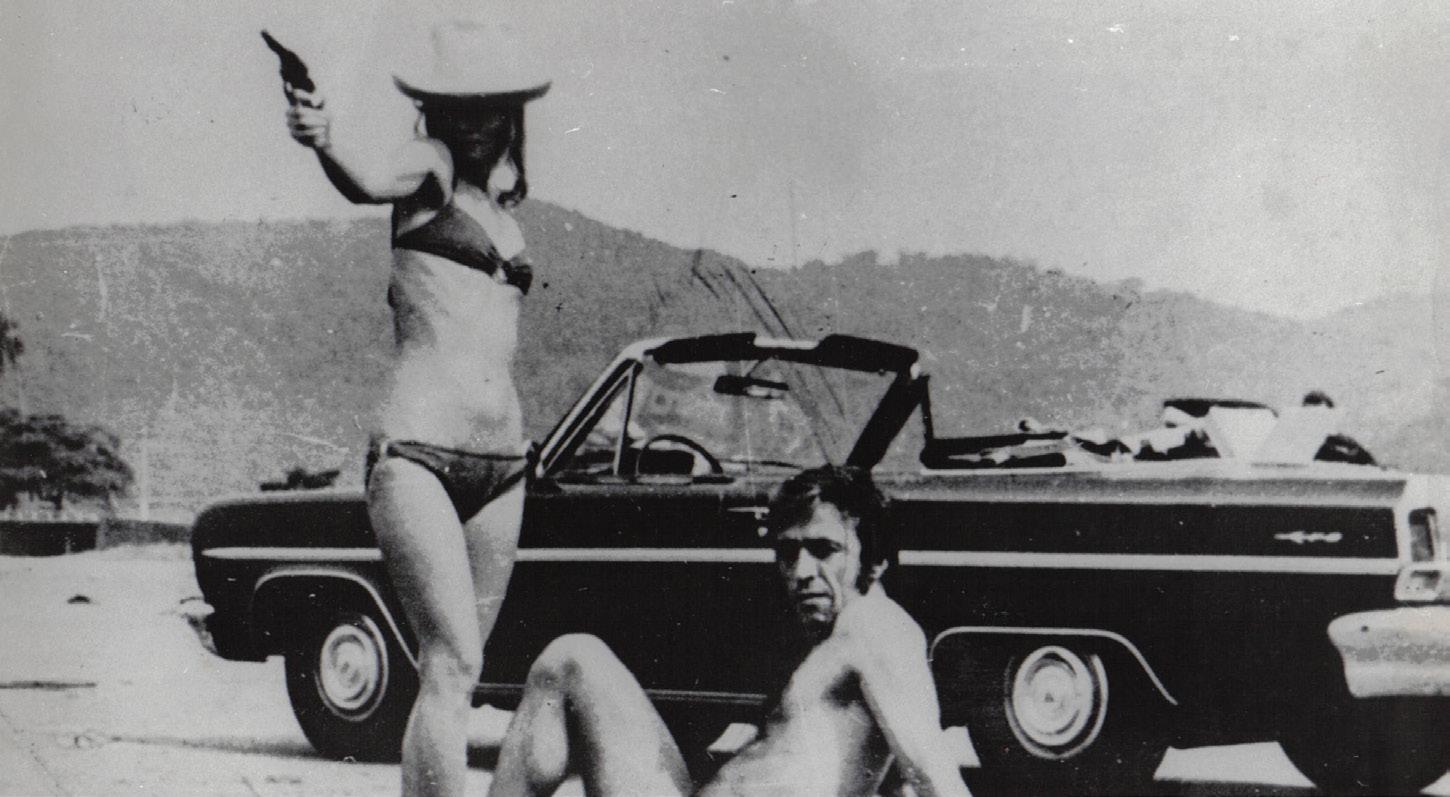
This October, Block Cinema explores the history of the horror genre through a variety of critical and creative lenses. Pairing new documentaries and classic films with in-depth introductions and discussions, including guest appearances by celebrated artists and scholars, this series promises to shed new light on film fright.
The Elephant Man 124 min Thursday, October 10, 7 PM David Lynch, 1980, USA/UK, 35mm
In a career of defying expectations, David Lynch’s second feature remains an anomaly: a period biography in which the director’s hallmark strangeness comes from historical fact rather than his own imagination. It’s the story of John Merrick—the genetically disfigured “Elephant Man”—who is rescued from a life as an exploited side-show attraction by a doctor who sees the humanity behind the deformities. Although noted for its evocative black and white cinematography and for John Hurt’s sensitive and powerful performance as Merrick, the film’s emotional landscape derives, as in all of Lynch’s works, from its rich, atmospheric use of sound. Seven time Academy Award–winning sound designer Gary Rydstrom (Saving Private Ryan, Titanic, Finding Nemo) will return to Block Cinema to introduce the film. Co-presented by Block Cinema and the Northwestern MA in Sound Arts and Industries. Print courtesy of Lowell Peterson, ASC, and the UCLA Film & Television Archive.
Horror Noire: A History of Black Horror 83 min Friday, October 25, 7 PM Xavier Burgin, 2019, USA, DCP
Author and University of Michigan Professor Robin R. Means Coleman will introduce and discuss the new documentary Horror Noire, based on her field-changing 2011 book Horror Noire: Blacks in American Horror Films from the 1890s to the Present. Both the book and the film examine the alternately problematic and affirming history of Black Americans in the horror genre, in front of and behind the camera. The documentary pairs filmmakers, actors, and scholars (including Coleman, who is also an executive producer of the film) in lively discussions and features a wealth of clips from iconic films from the past and present. Co-presented by Block Cinema and Humanities On the MAP, sponsored by the School of Communication.
I Walked with a Zombie 69 min Thursday, October 31, 7 PM Jacques Tourneur, 1943, USA, 35mm
The collaboration between RKO producer Val Lewton and director Jacques Tourneur is one of the most celebrated in the history of horror, and I Walked with a Zombie may be the pair’s masterpiece. This subtle and unnerving supernatural tale, inspired by Charlotte Brontë’s Jane Eyre, unfolds on a West Indies sugar plantation, where a voodoo curse seems to possess the soul of the plantation owner’s wife. The film’s mesmerizing low-key cinematography conjures an atmosphere of exotic dread and uncertainty, but the darkest shadow in this Gothic melodrama is the one cast by the island’s ugly history of slavery and colonialism. James J. Hodge, Associate Professor of English and the Humanities, and Ashley R. Smith, doctoral candidate in Screen Cultures, will introduce the film. Print courtesy of the Library of Congress.
Technology Transformations: A Feminist History of the Supercut Friday, February 22, 7 PM
This screening traces histories of gendered reproductions in media through the form of the “Supercut.” A viral video genre, supercuts compile multiple instances of a single theme, utterance, cliché, or image from pop culture sources. Pairing early feminist supercuts by artists such as Dara Birnbaum, with contemporary works by such artists as Natalie Bookchin and Jennifer Proctor, this program reveals how the supercut offers a powerful tool for remixing the social reproduction of gender in media from cinema to YouTube. Filmmaker Jennifer Proctor will join Professor of English James Hodge for a conversation after the screening.
Birthright: A War Story 105 min Friday, March 8, 6:30 PM Civia Tamarkin, 2017, USA, digital
While access to abortion is often front and center in debates, the matter of choice is just one factor in a broad assault on the privacy and autonomy of women. This searing documentary, described as a real-lfe “handmaid’s tale,” provides a comprehensive overview of the “war on women.” Anchored in the lived experiences of women whose access to reproductive healthcare has been regulated and restricted, the film builds on these testimonies to paint a shocking picture of the forces shaping women’s health policy. Director Civia Tamarkin will introduce the film, and will join Sekile Nzinga-Johnson, Director of the Northwestern Women’s Center, for post-film discussion.
Ilo Ilo 99 min Saturday, March 9, 1 PM Anthony Chen, 2013, Singapore, DCP
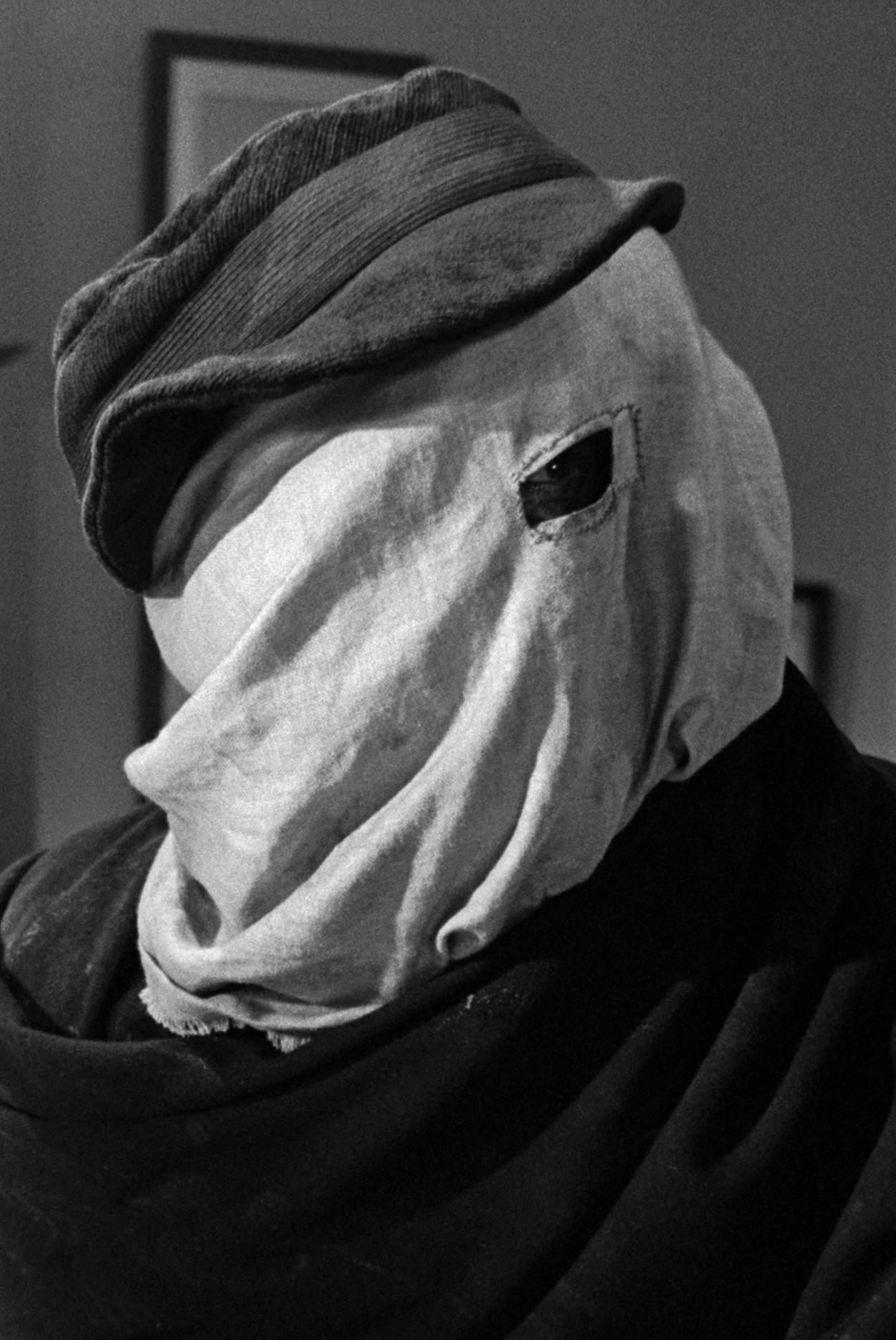
Winner of the Camera d’Or award for best first feature at the 2013 Cannes Film Festival, Anthony Chen’s engrossing and empathetic drama Ilo Ilo tackles the emotional and socioeconomic complexities of care work in the age of globalization. The story centers on Teresa, a Filipina domestic worker hired by a Singaporean family just before the Asian financial crisis of 1997. Drawing on his own experiences, Chen looks incisively at inequities of class and gender in family dynamics and the delegation of domestic labor. (In Hokkien, English, Tagalog, and Mandarin with English subtitles)

Presented in conjunction with The Block’s exhibition Pop América,1965–1975, Block Cinema screens selected programs from Ism, Ism, Ism, a groundbreaking touring film series that offers the first comprehensive survey of Latin America’s vibrant experimental film history. Organized by filmmakers and curators/critics Jesse Lerner and Luciano Piazza as part of the Getty’s Pacific Standard Time II: LA/LA initiative, these programs feature key works made between the 1930s and the 2000s across the Americas. The Block will host five programs from the series and will copresent another six programs at venues around Chicago.
For All Mankind,1989
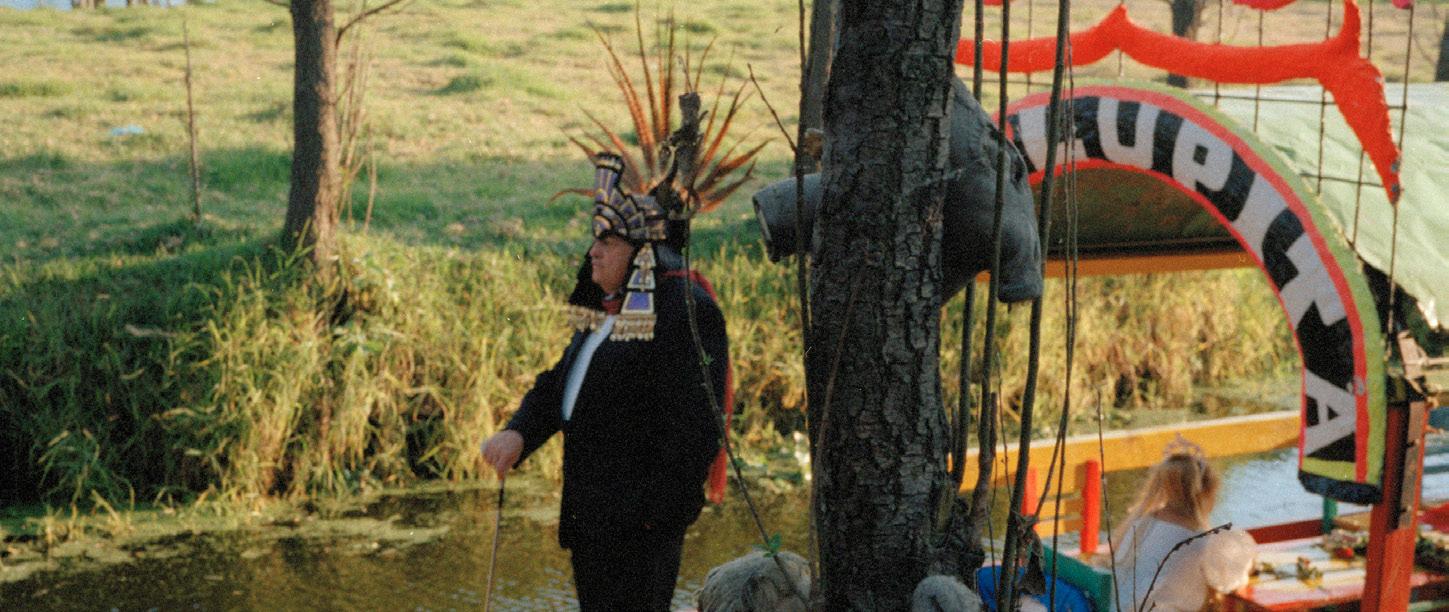
Mariana Botey, El dedal de rosas, 1998
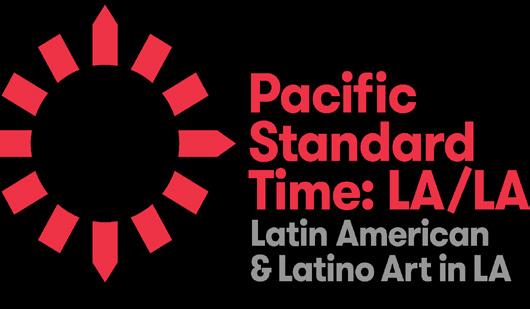
Ism, Ism, Ism: Experimental Cinema in Latin America (Ismo, Ismo, Ismo: Cine experimental en América Latina) was organized by Los Angeles Filmforum as part of Pacific Standard Time: LA/LA, a far-reaching and ambitious exploration of Latin American and Latino art in dialogue with Los Angeles. Ism, Ism, Ism surveys Latin America’s vibrant experimental production from the 1930s through today. www.ismismism.org
Ism, Ism, Ism is accompanied by a bilingual publication, Ism, Ism, Ism / Ismo, Ismo, Ismo: Experimental Cinema in Latin America (Jesse Lerner and Luciano Piazza, editors, University of California Press, 2017) that places Latino and Latin American experimental cinema within a broader dialogue by exploring different periods, cultural contexts, image-making models, and considerations of these filmmakers within international cinema. Available worldwide at https://www.ucpress.edu/.
Lead support for Ism, Ism, Ism is provided through grants from the Getty Foundation. Significant additional support comes from the Andy Warhol Foundation for the Visual Arts, the National Endowment for the Arts, and the Mike Kelley Foundation for the Arts. Pacific Standard Time is an initiative of the Getty. The presenting sponsor is Bank of America.
Dialogues with Che: Appropriations of a Revolutionary Figure 96 min Thursday, October 3, 7 PM Various Artists, 1968–1997, Various Countries, digital and 16mm
Images of Ernesto “Che” Guevara are the most contested and reproduced in Latin America, and this program explores ways this iconic figure has been represented in experimental films. Dialogue with Che, by legendary queer Nuyorican artist José Rodriguez Soltero, parodies Hollywood portrayals of the revolutionary hero. Photographic representations of Che are the subject of both Pedro Chaskel’s A Photograph Travels the World, which analyzes an iconic still taken by Alberto Korda at a political rally in 1960, and Leandro Katz’s El día que me quieras (The Day You’ll Love Me), which traces the story behind the last photographs of Che Guevara – taken by Freddy Alborta in 1967–as he lay dead, surrounded by his captors.
Dreams of Suitcases and a Blue Lobster 70 min Friday, October 11, 7 PM Various Artists, 1933–1998, Various Countries, digital
A program of short films that explore cinema’s oneiric, disturbing, and irrational potential. Filmed in 1954 in a Colombian fishing town, The Blue Lobster anticipates Magical Realism with a tale of a foreign secret agent who is investigating radioactive lobsters. Lost for decades in a Chilean archive, La maleta, the first film by celebrated auteur Raúl Ruiz, offers a surreal mix of suitcases and somnambulists. Mariana Botey’s El dedal de rosas, in collaboration with the actor-directorartist Juan José Gurrola, represents an intersection between two generations of Mexico’s avantgarde. In person: Ism, Ism, Ism co-curator Jesse Lerner
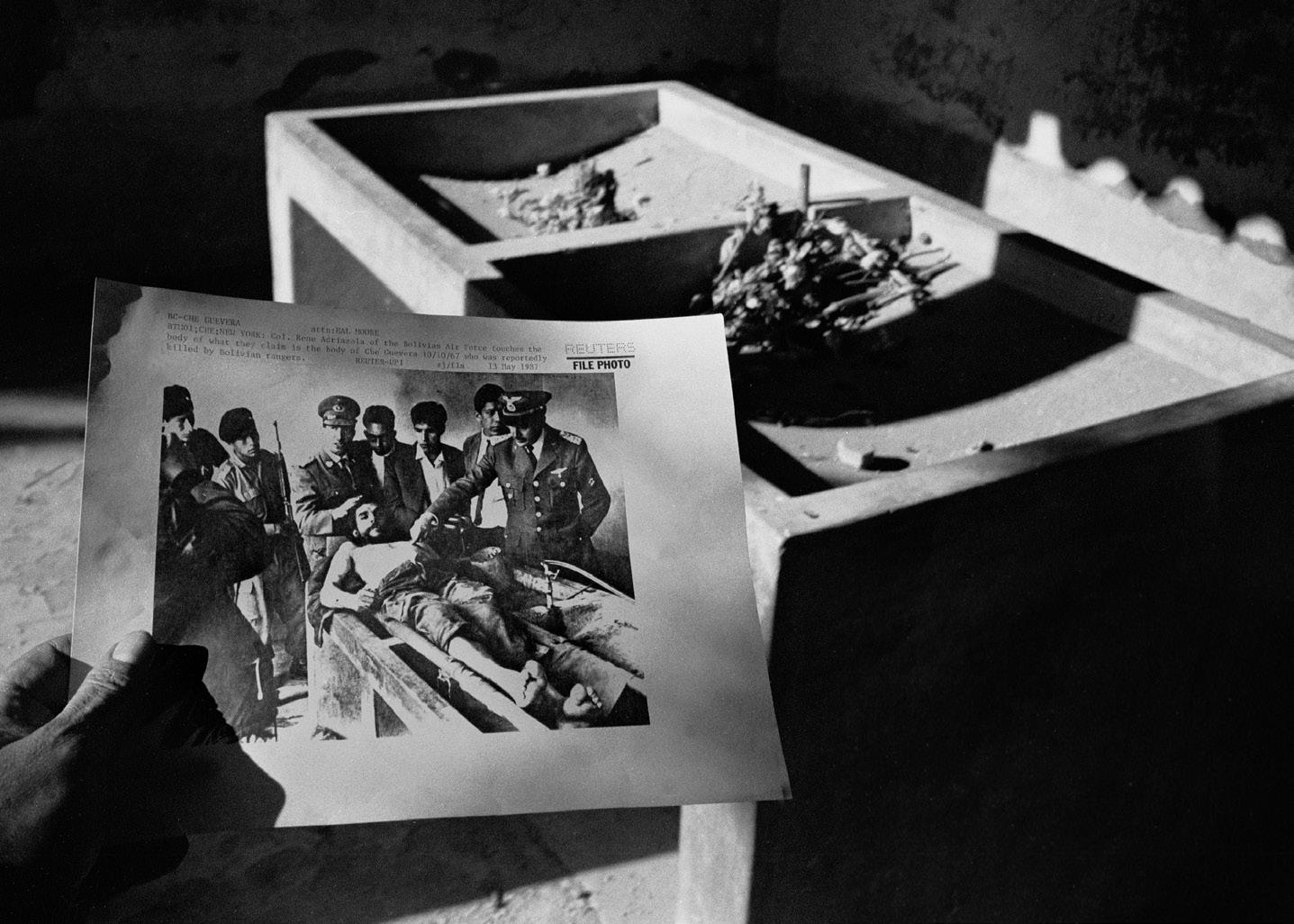
Countercultures and Undergrounds 77 min Friday, October 18, 7 PM Various Artists, 1967–1979, Various Countries, digital and 16mm
This program explores countercultural and underground practices across a range of local and global movements. Several films document performances, ephemeral actions, or public interventions, as in Narcisa Hirsch’s Marabunta, which chronicles her interaction with an audience coming out of a screening of Antonioni’s Blow-Up. Manuel Delanda’s Ismism captures the filmmaker’s own interventions with an X-Acto knife on Manhattan billboards. Films by Sérgio Péo and Rolando Peña disrupt urban spaces, while Alfredo Gurrola’s Segunda Primera Matriz uses poetry in the service of radical, alternative culture.
Manuel Delanda, Ismism, 1979
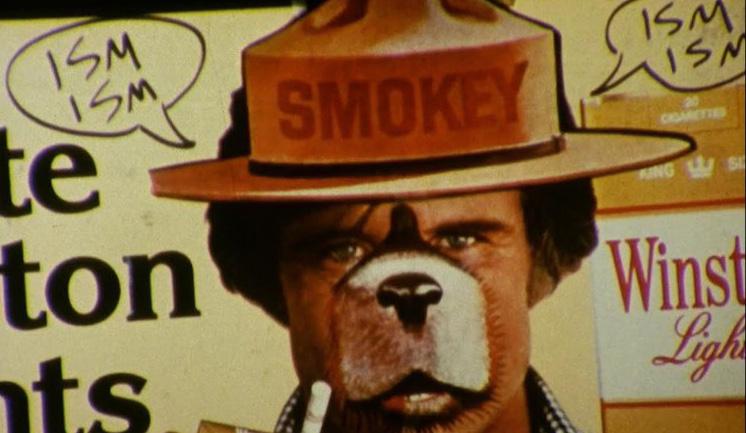
Recycled Cinema 61 min Friday, November 1, 7 PM Various Artists, 1958–2012, Various Countries, digital
Estrellas de Ayer: Latin Camp 73 min Friday, November 1, 8:30 PM Various Artists, 1959–1975, Various Countries, digital and 16mm
This evening offers two programs exploring alternative strategies of appropriation: found footage and camp. “Recycled Cinema” presents acts of decolonization and critique through collages of appropriated images and audio, challenging dominant modes of representation. In 1958’s Cowboy and ‘Indian’ Film, Nuyoriquen artist Raphael Montañez Ortiz hacked the reels of an American western to pieces with a tomahawk “to release their evil,” while a more recent work, Artemio’s Apoohcalypse Now, is a mash-up of Disney’s Winnie the Pooh and Apocalypse Now. The filmmakers in “Estrellas de Ayer: Latin Camp” borrow an alternative reading of Hollywood stars, emphasizing queer nostalgia and excess. Films such as Teo Hernandez’s Estrellas de ayer and José Rodriguez Soltero’s Lupe pay homage to Greta Garbo, Joan Crawford, Marlene Dietrich, and Lupe Vélez with performative extravagance.
José Rodriguez Soltero, Lupe, 1966

Ism, Ism, Ism: Chicago Screenings
Block Cinema is proud to co-present additional Ism, Ism, Ism screenings at micro-cinema venues around Chicago. More info at www.blockmuseum.northwestern.edu.
Nightingale Cinema (1084 N Milwaukee Ave, Chicago, IL) Meta: Cinema Critiques Cinema - Wednesday, October 9, 7 PM Umbrales - Wednesday,November 13, 7 PM
Filmfront (1740 W 18th St, Chicago, IL) Dark Matter - Saturday, October 12, 7 PM, with co-curator Jesse Lerner in person Bilingual Aesthetics - Saturday, October 19, 7 PM
Comfort Station (2579 N Milwaukee Ave, Chicago, IL) Psychedelia and Abstraction - Wednesday, November 6, 8 PM
ACRE (1345 W 19th St, Chicago, IL) Urban Harmonies/Dissonant Cities - Saturday, November 16, 7 PM
Drawing on the example of the 2019–2020 One Book One Northwestern selection, Margot Lee Shetterly’s Hidden Figures: The Untold True Story of Four African-American Women who Helped Launch Our Nation Into Space, Block Cinema presents a yearlong series celebrating the history of women of color behind the camera. Featuring rarely screened films and in-depth discussions with filmmakers and historians, these programs also seek to champion the scholars, educators, curators, and archivists who work to make these histories visible today. Programs co-presented by Block Cinema and One Book One Northwestern.
Sisters in Cinema: An Evening with Yvonne Welbon 62 min Wednesday, October 16, 7 PM Yvonne Welbon, 2003, USA, digital
Block Cinema welcomes Chicago-based filmmaker (and Northwestern Film Studies PhD) Yvonne Welbon to present her 2003 documentary Sisters in Cinema. In the film, Welbon explores the history of African-American women feature film directors from the 1920s onward, including Cheryl Dunye, Zeinabu irene Davis, Julie Dash, and others. An accomplished filmmaker herself, Welbon will discuss her own experiences as a working artist, scholar, and advocate, including her current project, a new Sisters in Cinema brick-and-mortar resource center on Chicago’s South Side.
One Way or Another 78 min Wednesday, October 23, 7:30 PM Sara Gómez, 1974/1977, Cuba, 16mm
In more ways than one, Afro-Cuban filmmaker Sara Gómez (1942–1974) was a trailblazer—the first woman director at the Cuban Film Institute (ICAIC), she pioneered a hybrid documentarynarrative form with her only feature, De Cierta Manera (One Way or Another). The film uses a fictional love story between a man and a woman from vastly different backgrounds to study the complexity of post-revolutionary Cuban society, frankly addressing questions of class, machismo, Afro-Cuban traditions, and the unequal educational opportunities for men and women. Completed after Gómez’s sudden death at age 31, One Way or Another stands today as a major milestone in both Latin American and Black women’s cinema. Print courtesy of the MCM Archives at Brown University.
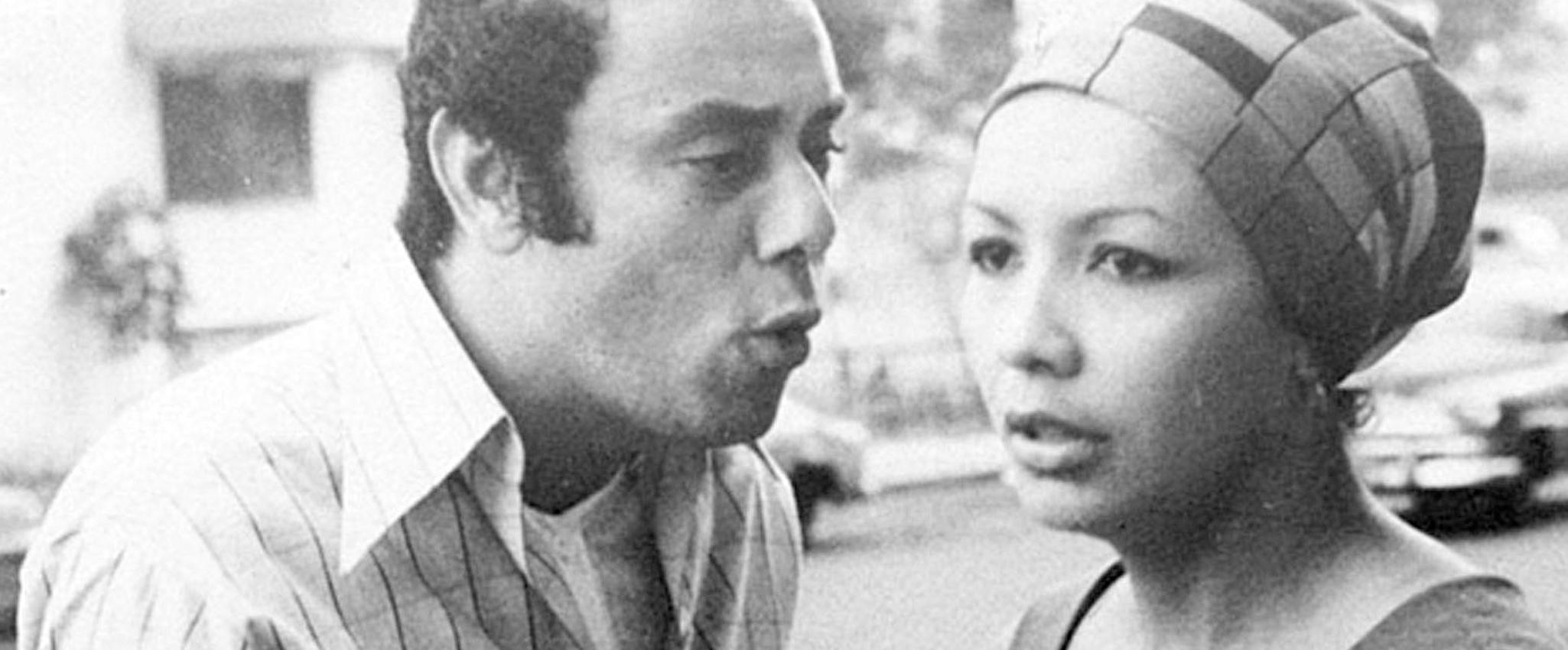
The Block Museum’s ongoing New Docs series, presented with the MFA in Documentary Media, features brand-new documentaries with filmmakers in person.
The Prison in Twelve Landscapes, 2016
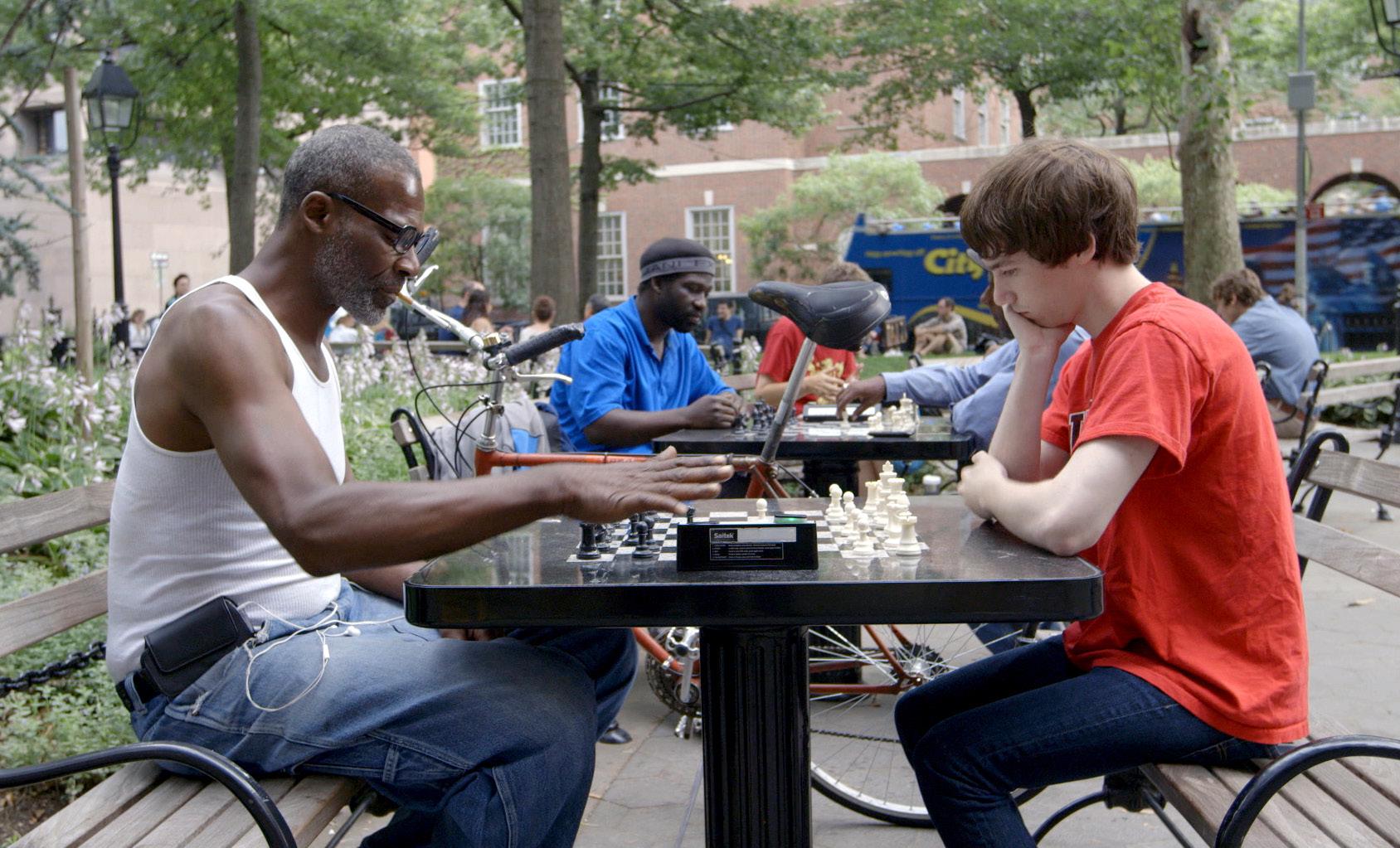
The Prison in Twelve Landscapes 90 min Thursday, November 7, 7 PM Brett Story, 2016, USA, DCP
The Block welcomes Toronto-based filmmaker Brett Story for two nights of her acclaimed documentary films. The Prison in Twelve Landscapes explores the criminal justice system and mass incarceration in the US from a number of oblique vantage points. Story looks at female prisoners used as labor to fight California wildfires; a Bronx warehouse for prisoner care packages; a rural coal town anticipating jobs at a new prison; and Ferguson, Missouri, where Michael Brown was killed. Throughout, Story connects the ways that the prison-industrial complex reverberates through communities around the country, illuminating the reach of the prison system beyond penitentiary walls. In person: filmmaker Brett Story Co-presented by Block Cinema with the Kaplan Institute for the Humanities and the MFA in Documentary Media.
The Hottest August 94 min Friday, November 8, 7 PM Brett Story, 2019, USA, DCP
27 THE BLOCK MUSEUM OF ART Brett Story’s newest film is billed as “a film about climate change, disguised as a portrait of collective anxiety.” The Hottest August offers a snapshot of the state of the country in August 2017 as viewed by residents of New York City. What are people worried about (rising rents, a still-new president, wildfires on the west coast, hurricanes on the east coast) and what do they see for the future? As the city swelters, Story weaves the people and places of NYC into a larger picture of a society buffeted by one crisis after another, capped by the persistent threat of climate change. In person: filmmaker Brett Story Co-presented by Block Cinema with Humanities On the MAP and sponsored by the School of Communication and the MFA in Documentary Media.
Félicité 123 min Friday, September 27, 6:30 PM Alain Gomis, 2017, France/Belgium/Senegal Germany/Lebanon, DCP
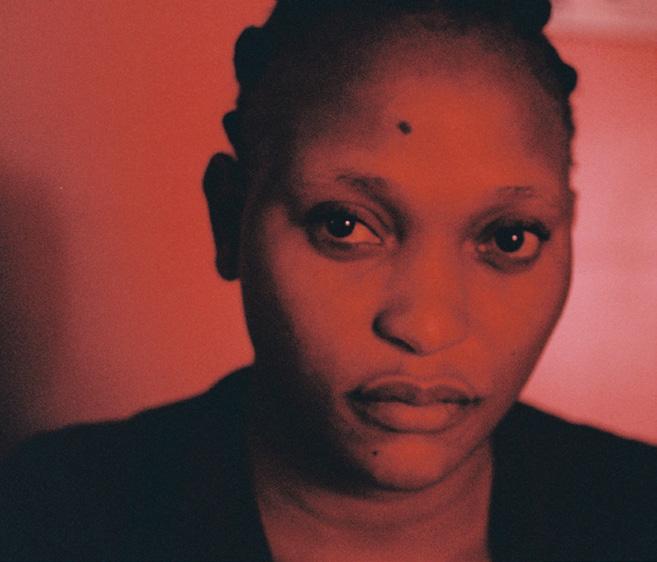
The award-winning drama Félicité stars Congolese musician Véro Tshanda Beya Mputu as a nightclub singer who learns that her teenage son has been gravely injured in a motorcycle accident. As she races across Kinshasa to gather money for her son’s operation, director Alain Gomis juxtaposes Félicité’s dreamlike journey with her music, performed by Mputu with her ensemble, the Kasai Allstars. Gomis will appear in person for a discussion with a panel of Northwestern students and scholars. In person: filmmaker Alain Gomis Co-presented by Block Cinema and the Northwestern Program in African Studies.
PERFORMANCE My First Film Friday, October 4, 7 PM Zia Anger, 2019, USA, digital with live performance
75 min
My First Film is a feature-length multimedia performance in which filmmaker Zia Anger interacts live with media on screen and with the audience, using real-time text, spontaneous Google searches, audience directives, and AirDrops. Through the performance, Anger probes and dissects her “abandoned” works to re-imagine the relationship among the audience, the filmmaker, the movie theater, and cinema, and erases the line between a filmmaker’s corporeal body and her body of work. A vital, singular, innovative performance that explores what it means to be a woman and an artist, the project showcases Anger’s sensibilities and pushes the boundaries of cinematic experience. In person: filmmaker Zia Anger
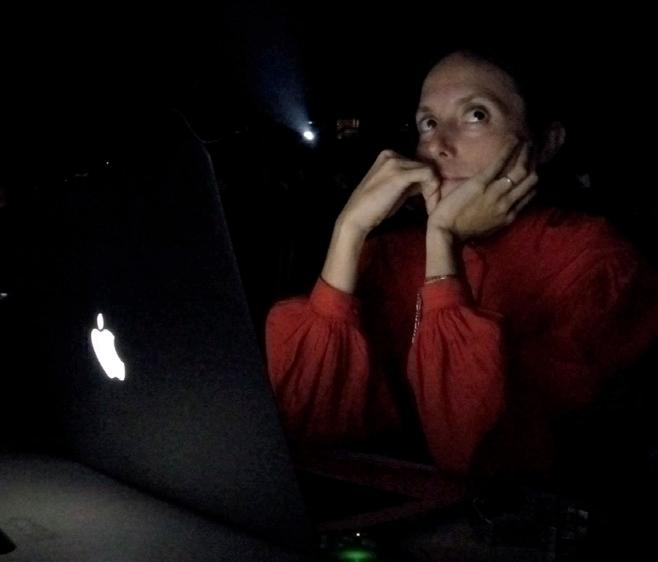
“A cathartic collective experiment in what it might mean to challenge failure, recalibrate it, and reclaim it anew.” —Sight and Sound
Nostalgia for the Light 90 min Thursday, October 17, 7 PM Patricio Guzmán, 2010, France/Germany/Chile/ Spain, 35mm
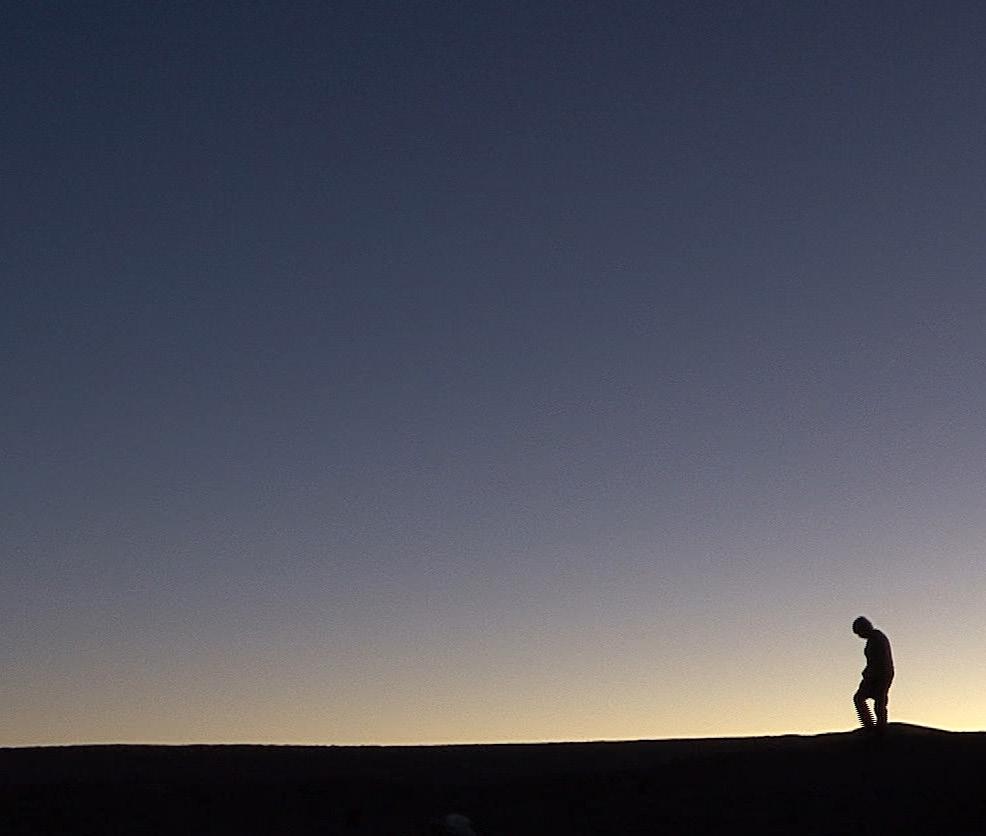
Thirty-five years after his landmark 1975 film, The Battle of Chile, vividly captured the chaos surrounding the overthrow of the Allende government, documentarian Patricio Guzmán returns to the painful memories of the Pinochet years in Nostalgia for the Light. This moving film explores Chile’s Atacama desert, home to one of the world’s most powerful observatories—and the bones of hundreds of political prisoners abducted and murdered by the military regime. Guzmán artfully juxtaposes our universal search for answers with the quest for justice carried on by the nation’s survivors. Lily Frusciante, doctoral candidate in Northwestern’s Department of Spanish & Portuguese, will introduce the film.
2019 Eyeworks Festival of Experimental Animation Saturday, November 2, 12:30 PM and 3 PM
Now in its tenth year (and its fifth year at Block), the Eyeworks Festival of Experimental Animation is a thoughtfully curated showcase of abstract animation and unconventional character animation that features brand-new work, recent discoveries, and tantalizing retrospective selections. Founded and programmed by filmmakers and artists Alexander Stewart and Lilli Carré, this year’s presentation at The Block will include short works by Janie Geiser, Barbara Hammer, Allison Schulnik, Kevin Eskew, Sebastian Buerkner, and many more, in two different programs. In person: festival curators Alexander Stewart and Lilli Carré
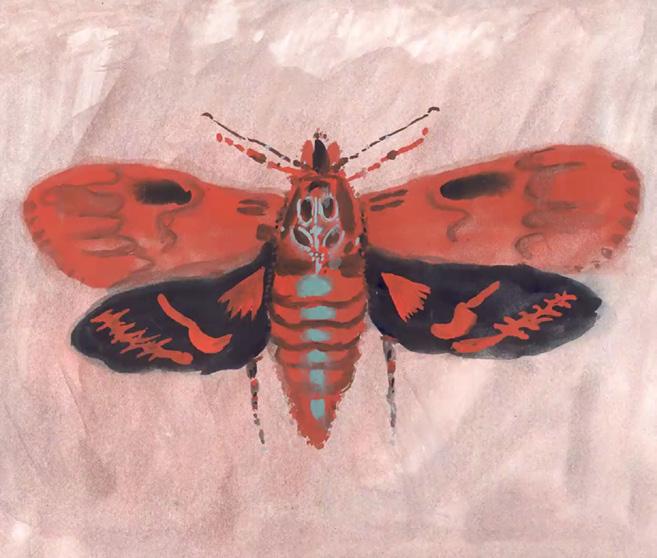
“Eyeworks fuses the finest boundary-obliterating animations from past masters and contemporary virtuosos. An annual mind-melding cinematic spectacle not to be missed.” —John Klacsmann, Anthology Film Archives
Whose Streets? 90 min Friday, November 15, 7 PM Sabaah Folayan & Damon Davis, 2017, USA, DCP
To commemorate the fifth anniversary of the Ferguson Uprising, Block Cinema partners with NU’s Black Arts Initiative and the Kaplan Institute to present Whose Streets?, a searing, up-close, and personal document of the resistance movement that emerged in the wake of the killing of unarmed teenager Michael Brown by Missouri police. Filmmaker and activist Sabaah Folayan will appear in person to discuss the film, which offers both a chilling record of militarized police repression and a stirring wake-up call to civil rights activists. Co-presented by Block Cinema with the Black Arts Initiative and the Alice Kaplan Institute for the Humanities.
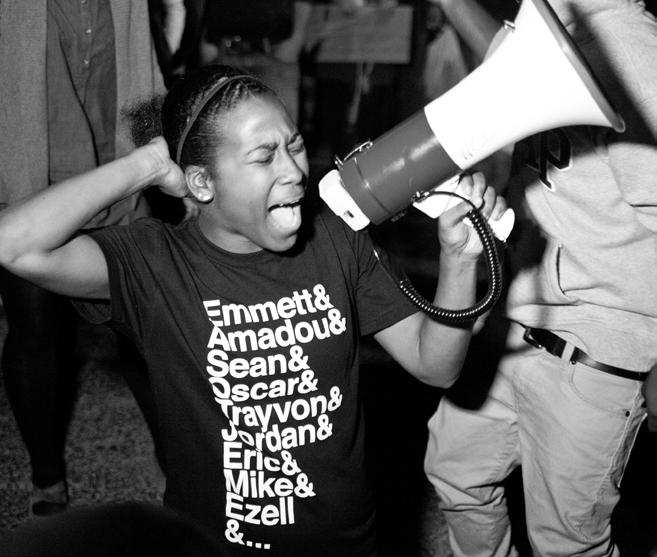
Amazements: Videos by Emily Vey Duke and Cooper Battersby Thursday, November 21, 7 PM
For 25 years, Emily Vey Duke and Cooper Battersby have been producing one of the most singular and exciting bodies of work in experimental cinema. Their videos combine animation, wry humor, and custom-written songs interwoven into vignettes that explore the perplexities, heartaches, and fleeting wonders of the contemporary world. This program features a selection of Duke and Battersby’s earlier work, as well as their most recent video, You Were an Amazement on the Day You Were Born. In person: artists Emily Vey Duke and Cooper Battersby

When the Earth Trembled, or The Strength of Love Friday, December 6, 7 PM Barry O’Neil, 1913, USA, 35mm, 43 min
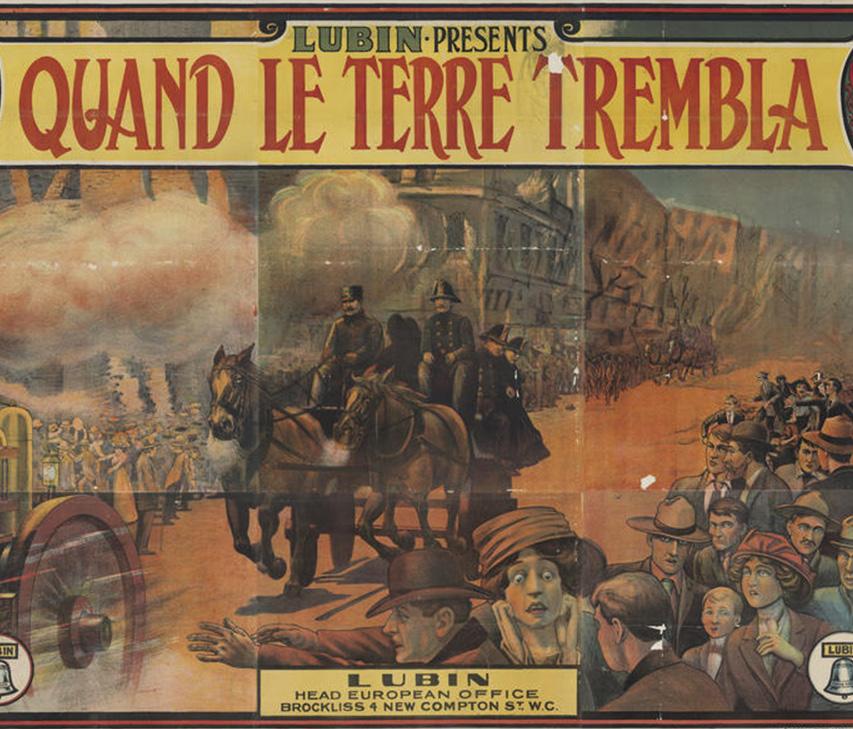
The first long film by the Lubin Manufacturing Company, an early cinema rival to Thomas Edison, When the Earth Trembled is both a family melodrama and an early spectacle, with the 1906 San Francisco earthquake as a central focus. Many of Lubin’s films were destroyed in a vault fire a few years later; Trembled will be accompanied by a selection of related films that survive purely by chance or only as fragments. Live accompaniment by David Drazin. Restored print courtesy of the San Francisco Silent Film Festival.
Pop América, 1965–1975 Duke University Press Hardcover | 2018 | $39.95 | English and Spanish | 216 pp. | 10 x 11 in. | 175 color illus.
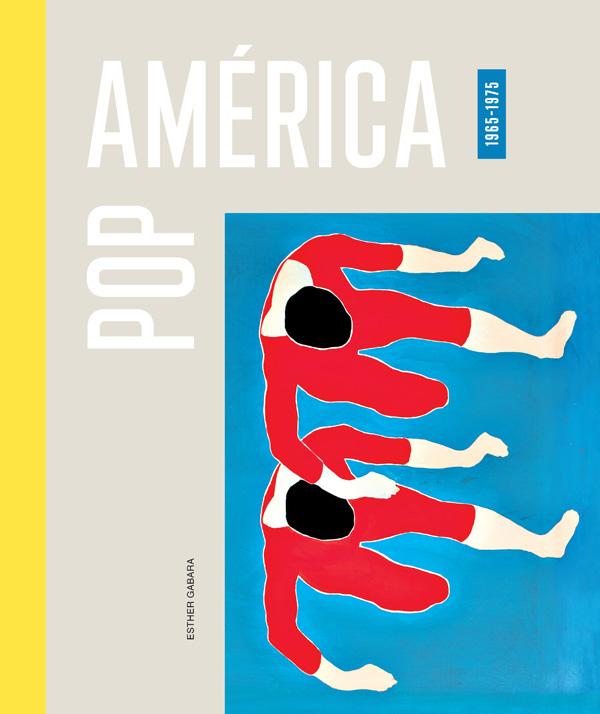
Pop América, 1965–1975 accompanies the first traveling exhibition to stage Pop Art as a hemispheric phenomenon. The bilingual, richly illustrated catalogue reveals the skill with which Latin American and Latinx artists adapted familiar languages of mass media, fashion, and advertising to create experimental art in a startling range of mediums. In a new era in hemispheric relations, artists enacted powerful debates over what “America” was and what Pop Art could do, offering a radical new view onto the postwar “American way of life” and Pop’s presumed political neutrality.
Nine essays grounded in original archival research narrate transnational accounts of how these artists remade América. The authors connect the decisive design of the Chicano/a movement in the United States with the vivid images of the Cuban Revolution and new contributions to the Mexican printmaking tradition. They follow iconic Pop images and tactics as they traveled between New York and São Paulo, Bogotá and Mexico City, San Francisco and La Habana. Pop Art emerges in a fully American profile, picturing youthful celebration and painful violence, urban development and rural practices, and pronouncements of freedom made equally by democratic and repressive regimes.
@nublockmuseum







40 Arts Circle DriveEvanston, IL 60208847.491.4000block-museum@northwestern.edu
a m e m b e r o f

